#gundam wingtionary
Text
“Tallgeese”: Why Is It Called That?
Okay, so, I have a theory.
Bear with me a moment. As far as I know, I’m the only person who thinks this might be the reason why the Tallgeese is called Tallgeese; I don’t know if it’s the RIGHT reason, but at least it's an explanation I think is etymologically and contextually feasible:
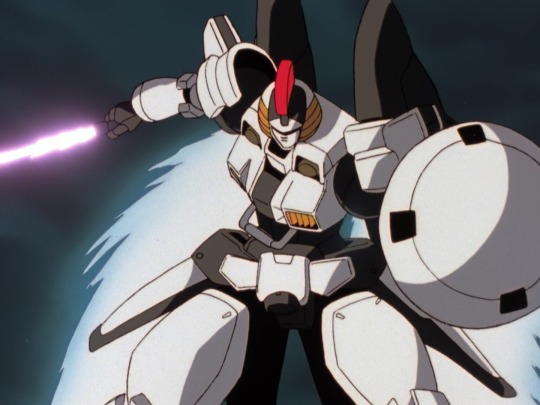
--If I may draw your attention to my man Tallgeese’s shield for a moment: you will see that it is a small, round buckler. Tallgeese is styled with a very fetching crest reminiscent of a Greek hoplite, and hoplites did indeed carry a round shield called an aspis.

(Image from the Harvard collection)
However! There is another kind of small, round shield that was used in less ancient times called a targe, or targa, or the diminutive target, where we get the word “target" from. The targe was a shield used largely for jousting and dueling– something the Tallgeese excels at!
When full plate armor was developed around the late 14th century, knights switched from using large, triangular shields, to the smaller and variously shaped targe shields, specifically for the sport of jousting¹. If you're looking at shields from medieval Europe in a museum you'll see a lot of fancy-shaped ones labeled targes.
Much later, it became synonymous with the Scottish targe, which is a regular combat shield and not a jousting shield, but it shares the same name and more importantly, is a small, round buckler typically used with a sword-- like the Tallgeese uses!
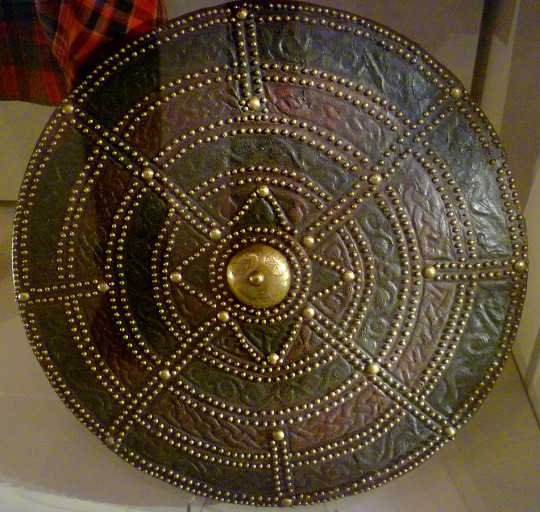
(A Highland targe exhibited in the National Museum of Scotland)
--Which leads me to my main point:
If you were looking up cool words for round or otherwise knightly shields, you might well come across the word “targe”. And if you pass the word “targe”(especially if you pronounce the final ‘e’) or “targes” through a Japanese phonetic filter, you might well get something close to “Tōrugisu” (トールギス), which is the name of our mobile suit.
…It might not be the canonical explanation for the Tallgeese’s name (to the best of my knowledge, there isn’t one²) but at least it’s slightly more relevant to its theming than is a waterfowl of alarming height-- though perhaps only a tenth as horrifying on the field of battle.
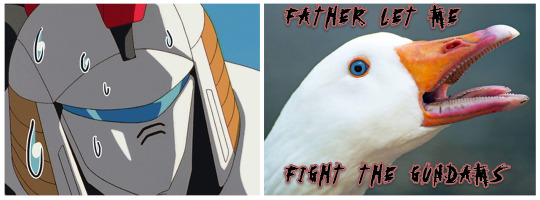
...Still I hear it in my dreams; the fell slapping of orange feet, the distant honk, the snapping beak...
________________
1) "The Seven Shields of Behaim: New Evidence": Metropolitan Museum Journal, v. 30, Nickel, Helmut (1995)
2) The Gundam Fan Wiki states in its Trivia section that: “The name Tallgeese is derived from the word "theurgist" (トールギスト), a ritualist who attempts to channel divine power to work miracles”. This is apparently from one of the SD Gundam games? Anyway, I find this source to be INCREDIBLY DUBIOUS.
92 notes
·
View notes
Text
“True Peace” and “Total Pacifism”:
the Peacecraft Ideals & the Point of it All
(buckle up, this is a long one)
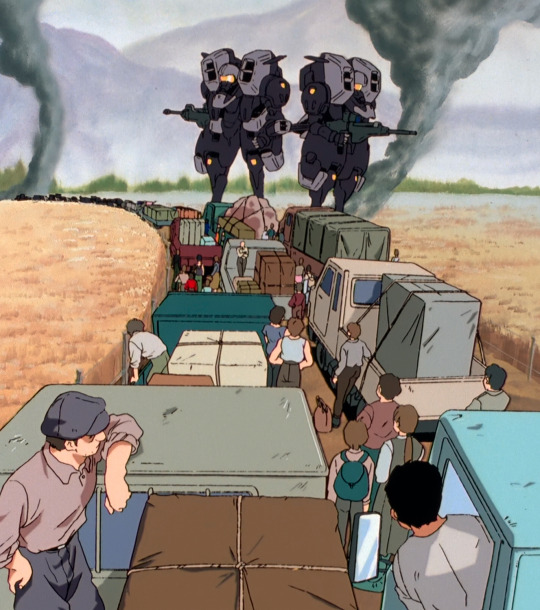
Capital “P” Peace is by far the most crucial concept in Gundam Wing.
It is a simple word that’s tossed around a lot and it pulls far too much weight for one little noun. The range of topics covered beneath this straining umbrella of a term includes everything from “a general sense of unthreatened well-being”, to “unilateral demilitarization and disbandment of global military rule”. The fault here lies not with translation difficulties or simplification for the ease of dubbing; real-world discussions of pacifism and peace are plagued by a lack of nuanced vocabulary as well. Alas, in this instance, it is the English language itself that has conspired to prank us.
Nevertheless, while overuse of the word is certainly frustrating at times, I find that when broken down and decoded, what may appear to be a lot of vague, flowery statements about the Virtues of Peace™ is actually a strategic political debate.
…Mostly. This is complicated somewhat by the fact that there are a significant number of characters for whom making flowery statements about the Virtues of War™ is a hobby and a way of life. So yes, indeed, sometimes convincing someone with Extreme Eyebrows that mankind can find value outside of eternal, violent conflict IS a priority that must be considered.
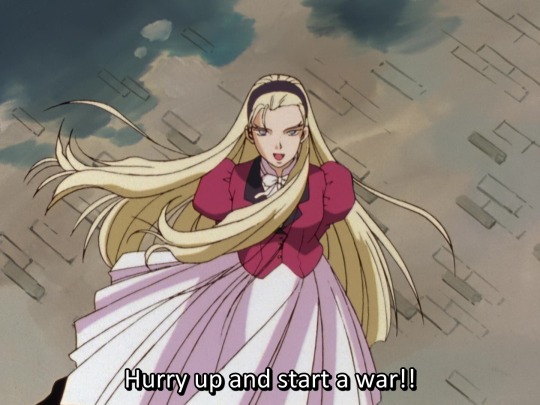
Part of why I think Gundam Wing had such a profound effect on its young audience when it came out is that it managed to cover most of an Intro to Ethics course in 49 episodes and a movie. It was a lot of kids’ first exposure to philosophy and politics, and it communicated its ideas by way of exciting robot fights and aspirationally cool characters. Gundam Wing made it easy to care about complex, abstract ideas and how they might affect the world– ideas that, at least for American audiences in the early 00’s, were well in advance of what they were likely to encounter in public school.
…Now, maybe you read that and found yourself thinking: “Come on, ‘peace is better than war’ is a pathetically simple dichotomy that no one needs to seriously debate”-- and I would love to give that to you. But as an American, I must beg you to consider that in the USA we have been trying to decide for decades whether an average of 75 school shootings per second is enough school shootings to consider implementing basic gun control.
Never underestimate the ability of a simple idea to become so polemicized that it becomes impossible to talk about or resolve without a total public paradigm shift– and now consider that learning how to cause a paradigm shift is exactly what Gundam Wing is all about.
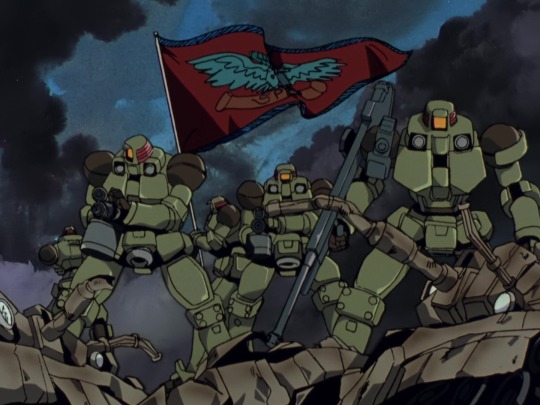
--There Is No War in A.C. 195--
For the majority of cases, when a character talks about war or peace, they mean specifically “between the Earth Sphere and the Space Colonies”-- as in, “an end to the conflict we have been embroiled in for roughly 20 years”.
This rather misleadingly makes it sound as though the Alliance is at war with the Colonies– but in AC 195, the Colonies do not have a military to go to war WITH. The Colonies aren’t engaged in a war with the Earth Sphere Alliance, they are under military occupation by the Earth Sphere Alliance.
When the Gundams first come to Earth and begin attacking the Alliance/OZ, the immediate question is: is this a declaration of war by the Colonies?
The burden continuously falls on the Colony ambassadors to prove that the Gundams are not politically associated with them. For all intents and purposes, they consider the retaliation of the Gundams to be acts of terrorism– which they must! Because otherwise they will indeed be at war with Earth, something the Colonies absolutely, 100%, definitively cannot afford. The Colonies are space bubbles. They can be popped. They can be blockaded. Earth provides the Colonies with the majority of their resources; declaring war against it would be insanity.
All this makes “peace with the Colonies” a very lopsided affair. Since officially speaking the Colonies have no military power, and since the nations of Earth that had previously allied with them were wiped out, negotiating for peace would require placing full trust in the Alliance. In other words, it would mean relying on the oppressor to stop oppressing purely as an act of goodwill.
This is why the “Peace Negotiations” proposed by the Alliance military leaders was at best a naive gesture that would have broken down at the first conflict of interest. The Alliance was responsible for the oppression of the Colonies to begin with– choosing to withdraw is a matter of their convenience; there is nothing to negotiate, because they have all the power. At worst, its “diplomacy” would simply be a farce designed to put a benevolent face on continued exploitation.
–Which is exactly what happens under OZ’s rule: “peace” is obtained in name only, while nothing about the power dynamic changes.
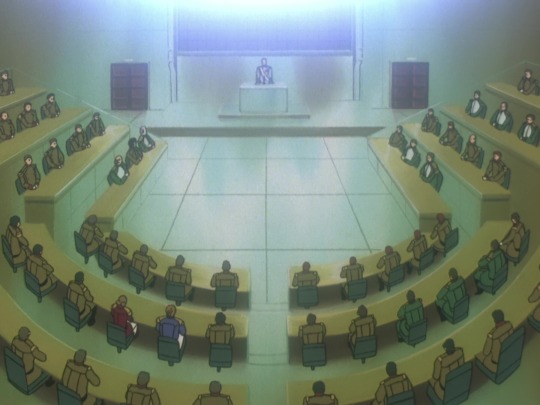
Here’s the trouble with settling for peace by any means: Every single military organization in Gundam Wing expresses a desire for world peace.
The Earth Sphere Alliance Military began as a peace-keeping measure. OZ claims it is correcting the Alliance’s failure to bring about world peace. Romefeller insists that it will bring about peace through a firm, authoritarian hand guided by the traditions of the ruling class. White Fang asserts that earth is responsible for all wars, and that peace can only be attained by destroying it.
There are many, many roads to “peace” that end in totalitarianism, to peace removed from liberty, to Pax Romefeller. In practice, White Fang’s approach would probably be the most effective at bringing about total, ever-lasting peace– if the result is all you care about, then sure, mass-extinction is one way to go!
But assuming we value peace because we ALSO value life and happiness and art and puppies and things like that, then we need to set the acceptable standard for peace somewhere above the eternal calm of a dead universe.
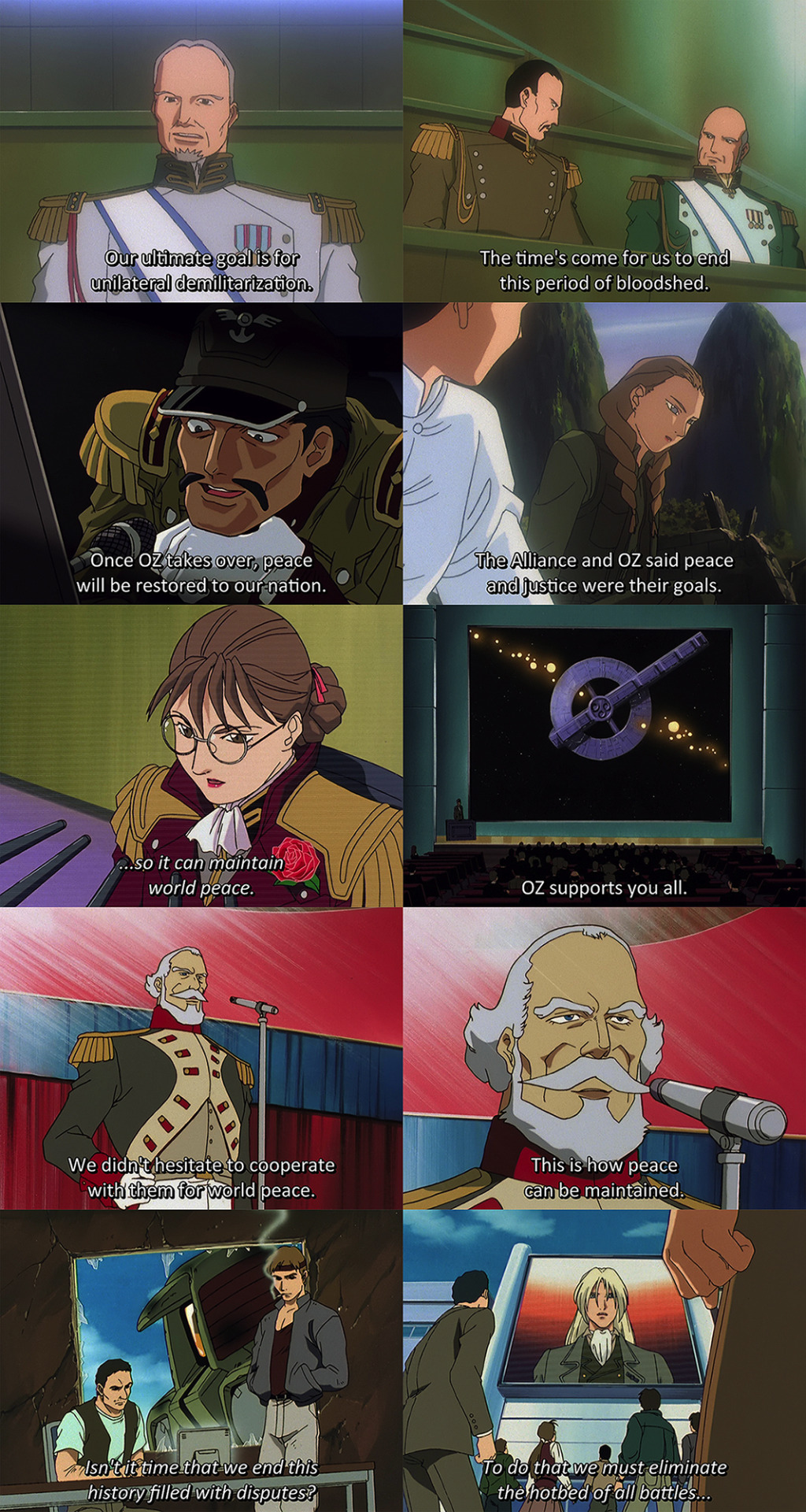
--The Peacecraft Ideals--
So, having established that “world peace by any means and any cost” is not a reasonable, humane, or moral outcome to strive for, we must consider “True Peace” to be a different outcome from “peace”.
As defined by Relena and ideals of the Sanc Kingdom, True Peace must be non-exploitative. It must require no threat of violence to enforce. To establish it, the means of military conflict must be removed and abolished, and the sources of human dispute must be addressed by means other than force of arms. Most importantly, True Peace requires fostering a transformational attitude towards peace– one that empowers the collective will of the people to both achieve and maintain peace.
To summarize, the Peacecraft plan of action is: 1) Remove weapons that are the means of military conflict, 2) Remove the primary sources of military conflict, and 3) unite people in the desire for peace, and to uphold peace.
It’s this last point that is so crucial to events that the entirety of the final narrative arc hinges upon answering the all-important questions: how does one foster the desire for peace, and bring about a massive paradigm shift that can change the course of history? and what price is one willing to pay for it?
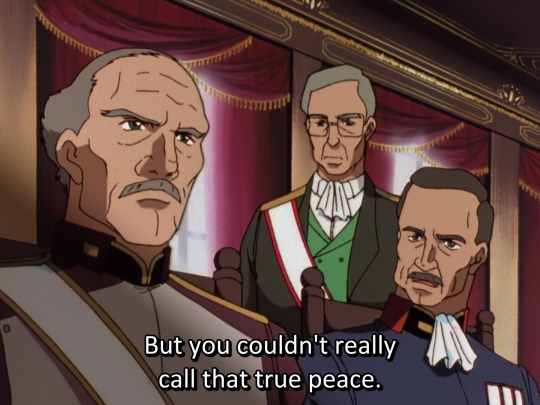
“Absolute pacifism [which is understood as a maximal and universal rejection of violence and war,] is an ideal. Some versions of absolute pacifism go so far as to abjure the idea of personal self-defense. Other absolute pacifists may allow for personal self-defense while rejecting the impersonal and political violence of war. Almost every defender of absolute pacifism recognizes the difficulty of attaining the absolute ideal.”
“The world often presents us with difficult ‘kill or be killed’ choices as in the question of self-defense or war. Absolute pacifists may hold that it is better to be killed than to kill. But such a choice may be impossible for many of us to make. Pacifists will often argue that this way of describing a situation—as one where the choice is ‘kill or be killed’—usually presents us with a false dilemma: often there are other nonviolent alternatives to either killing or being killed. But when presented with such a stark choice, absolute pacifism may require self-sacrifice.”
--“Pacifism”, Stanford Encyclopedia of Philosophy, Andrew Fiala, 2006
--Pulling back to real-earth for a moment: there is a wide and continuous spectrum of ethical, religious, political, and practical attitudes to be found spanning the distance between Absolute and Conditional forms of pacifism, but despite its similar name, the Total Pacifism of Gundam Wing is not a synonym for Absolute Pacifism:
There is no indication that Relena is against self-defense, nor that she insists on absolute non-violence; she’s a staunch defender of the Gundam pilots, after all, and they’re practically the face of violent resistance. She admits that in past history there were conflicts that could not have been avoided, and that one cannot maintain civilization without some degree of enforcement of principles. We can safely assume (especially after her change of heart in Endless Waltz) that she supports the proportional defensive reaction of people who are resisting oppression. But killing people is not, or at least very rarely, justifiable in her worldview (allowing for the fact that both Relena’s character and her philosophy evolve over the course of the series), and warfare never is.
“Peaceful intercourse is easily rejected by those who assert the benefits of the martial values, who claim that a war brings out the best of people and of a society, that wars heighten humanity s perception of itself in the great existentialist quest between life and death, that war relieves the monotony of consumerism and so on.
This highlights one of the most difficult aspects of pacificism, that the goal of peace and of tranquility may not suffice human nature. The persistent nagging of bellicosity, of adventure, personal and collective glory, whether it derives from something genetic or culturally deeply embedded in most societies, remains an easily revitalized clarion call to war. The culture of peace is often very shallow, taking many generations to produce, and even then can be swiftly eroded with atavistic rhetoric.”
--“Pacifism”, Internet Encyclopedia of Philosophy, Alexander Moseley
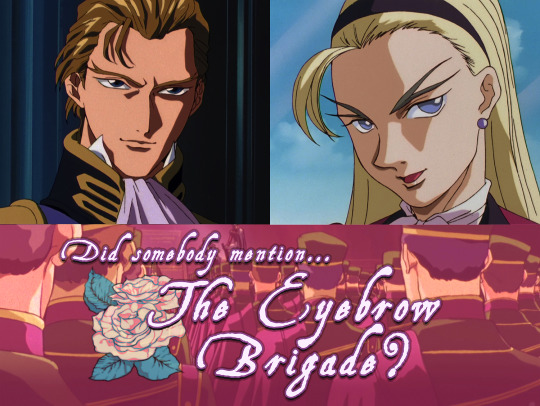
(...Remember what I said about needing to convince certain people that mankind can find value outside of eternal warfare?)
Relena’s Total Pacifism is primarily an anti-military political stance; it is only secondarily a philosophy of nonviolence. Over the course of the series, Relena confronts over and over again the notion that many people are drawn to the act of fighting for various reasons, ranging from the vindictive to the instinctual. It is not an impulse she shares or understands, but she recognizes that it exists. She is ready to admit that even within Total Pacifism, a world totally without violent desires may be impossible– but it is not necessary that people accept a world where those desires give rise to military conflict.
–Something that is worth noting is that the Peacecraft’s plan for total pacifism does not include a rubric for solving conflicts that do arise, only how they should NOT be solved.
In the series, the single method that Relena espouses for solving disputes is through “dialogue”-- something that is repeatedly pointed out to be a flawed and inadequate form of conflict resolution. “Dialogue” cannot solve all of humanity’s problems, that is unquestionably true– but neither is it a bad place to start as a baseline. More to the point, of all the possible conflicts and struggles that humanity might encounter in the vast expanse of the future, it’s futile to try and codify the best method of solving all of them based purely on abstract theory and best guesses.
Again, the Peacecraft ideal is only secondarily a philosophy; its primary goal is not to tell people HOW to solve all future problems, its goal is to solve ONE problem, and that one problem is war.
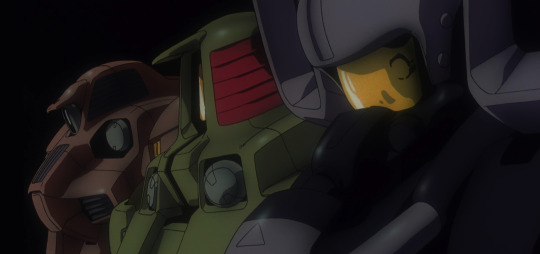
“Disarmament” Means Mobile Suits
Removing the possibility of military conflict is a preliminary for Total Pacifism, and therefore it is necessary to implement universal disarmament– and “disarmament” as it pertains to the conflicts of AC 195 means primarily the discarding and prohibition of Mobile Suits.
The reason for this is not simply because Mobile Suits are dangerous weapons. After all, Mobile Suit warfare is hardly the biggest or baddest type of war the human race has developed– leveling a city with Mobile Dolls couldn’t possibly be worse for people than leveling a city with an atomic bomb– the main thing Mobile Suits allow people to do is fight wars using infantry in space.
Not only do Mobile Suits allow for space combat, they also grant very granular control of combat zones and civilian populations without substantial risk to the troops– which is great if you’re trying to enforce military rule in the Colonies. Space fortresses and missile satellites are also threats of course, but where a missile attack would simply destroy or damage a Colony, Mobile Suits allow military forces to take direct control of it, the area around it, its resources, its populace; everything, inside and out. This is why disarmament of MS has to be a primary concern for de-escalating conflict between Earth and the Colonies: as long as Mobile Suits are still in the picture, the potential threat of domination by the Earth Sphere remains, and nobody in the Colonies is going to relax.
The Other Pacifists of A.C. 195
“Law never made men a whit more just; and, by means of their respect for it, even the well-disposed are daily made the agents of injustice. A common and natural result of an undue respect for the law is, that you may see a file of soldiers, colonel, captain, corporal, privates, powder-monkeys and all, marching in admirable order over hill and dale to the wars, against their wills, aye, against their common sense and consciences, which makes it very steep marching indeed, and produces a palpitation of the heart. They have no doubt that it is a damnable business in which they are concerned; they are all peaceably inclined. Now, what are they? Men at all? or small movable forts and magazines, at the service of some unscrupulous man in power? […]The mass of men serve the State thus, not as men mainly, but as machines, with their bodies. They are the standing army, and the militia, jailers, constables, posse comitatus, &c. In most cases there is no free exercise whatever of the judgment or of the moral sense; but they put themselves on a level with wood and earth and stones; and wooden men can perhaps be manufactured that will serve the purpose as well.”
—“On the Duty of Civil Disobedience”, Henry David Thoreau
The Sanc Kingdom is not the only proponent of pacifism in the Earth Sphere.
In the Autonomous Mountain Region of former China (helluva mouthful, you'd think they'd have given themselves an actual name), for instance, we’re shown another civic leader who gathers support for demilitarization and objects to Alliance occupation. Like the Colony leader Heero Yuy and King Peacecraft before him, this unnamed leader is assassinated, and his independent nation taken over by the local branch of the Alliance military.
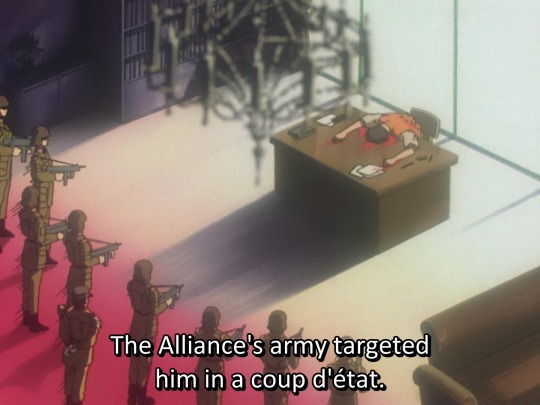
It’s only a brief footnote in the series, but it’s important because it demonstrates that the dream of pacifism is not dead on Earth, despite how often it has been violently silenced by the prevailing world order. It speaks to how powerfully the message spread by Yuy and the Sanc Kingdom resonated with people that their ideals continue to generate new martyrs; we see it also in the nations surrounding the Sanc Kingdom who are willing to stand up against Romefeller and refuse to participate in military affairs.
The existence of these nameless “Autonomous Regions” and “Independent Nations” shows us that there is at least some degree of successful resistance against the Earth Sphere government (whether that be the Alliance or OZ); it’s also clear by statements from Duke Dremail that these independent entities are considered a tremendous threat.
In a system of global military rule, to renounce the military is to essentially declare one’s withdrawal from the existing government– something that surprisingly doesn’t elicit immediate reprisal under Romefeller’s oligarchy, at least when the seceding nations offer no armed resistance.
But the rise of pacifistic nations on earth is nevertheless regarded with as much suspicion and hostility in A.C. 195 as it was during the Sanc Kingdom’s first bid for Total Pacifism, and while Romefeller, unlike the Alliance, is either unwilling or lacks the unilateral authority to quash dissenters without justification, it is more than willing to manufacture justifications to remove political rivals from the playing field. But what’s important is that they still need that manufactured justification– Romefeller, like any authority structure, requires a certain level of assent and cooperation in order to maintain power.
The practical implication of multiple countries withdrawing from the Earth Sphere and/or refusing to support the global military, is that the Earth Sphere government has fewer nations to tax and draw on for resources or support, and more places where rebel elements can take refuge. In the long run, a sufficient number of simultaneously defecting nations could mean the collapse of global military rule itself.
Armies and weapons and soldiers don’t spawn automatically on a map. Everything has to come from somewhere, and a global military organization needs to be supplied and maintained by the globe.
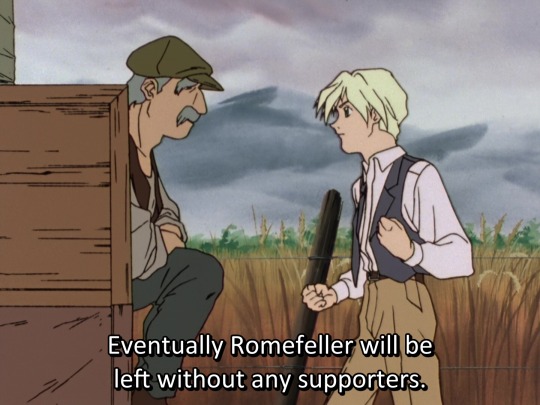
Whatever the Alliance’s policies were, it’s safe to assume that OZ/Romefeller inherited and maintained many of them, partly because they were always part of the decision making process, and also because hey, why let a perfectly good global bureaucratic infrastructure go to waste? The Alliance began as a cooperative global peace-keeping initiative; at its root, it was developed from international bureaucracy, rather than an imposed dictatorship. Even after it became the dominating world government, that underlying bureaucratic structure surely remained to some extent. National borders were still recognized, at least as an organizational convenience; the Alliance relied on taxes from the various recognized nations under their control (including the Colonies), as well as the heavily-incentivized funding of the arms industry, tied to the wealthy estates of the Romefeller Foundation, many of whose members were leaders or rulers of different nations themselves. It’s also likely there was some sort of draft for citizens of the Earth Sphere and the Colonies.
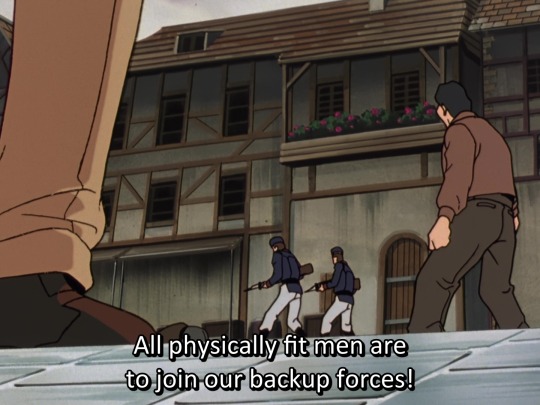
Why does this matter? Because in non-violent resistance, particularly in civil disobedience and non-compliance, it’s necessary to find ways to gain leverage that don’t involve offensive combat. In the case of resisting a military oppressor, learning what conditions allow the military to continue operating, and how to disrupt that operation, is of key importance.
Outside of Earth, we’re shown another notable example of disruptive resistance from the Winner family– adamant pacifists themselves, though their sole male heir, Quatre, broke with tradition and chose to fight against OZ using the Gundam Sandrock. The Winner family is in charge of several major natural resource satellites, a primary source of supplies for the adjacent Colonies. When those Colonies allied themselves with OZ and began arming themselves in spite of their past commitment to pacifism, and in spite of OZ’s quite recent manipulative and violent suppression of the Colonies, the Winner family patriarch protested this move vehemently. When it was clear the now-militarizing Colony would continue supporting OZ and intended to begin manufacturing weapons on the natural resources satellite, Mr. Winner removed his support from the Colony– both ideologically and physically, by decoupling the resource satellite; a move that cost him his life at the hands of OZ.
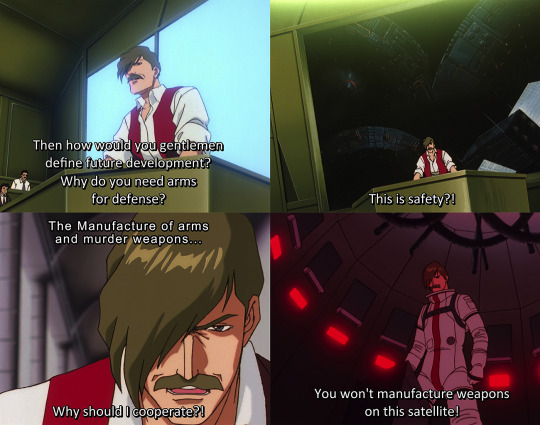
A Glass Kingdom Throws No Stones
The Sanc Kingdom’s existence is based on hope.
It assumes peace (i.e. a state of goodwill and non-conflict) is the natural state humanity longs for, the only condition it can truly flourish in, and therefore it is in everyone’s best interest to pursue. Even those who advocate in favor of war would eventually see the pragmatic benefit of peace– wars are costly, and demand a constant supply of resources and humans to throw into it. If everyone simply acknowledged these truths, True Peace ought to be the inevitable outcome.
This position is largely (but not universally) viewed as naive, idealistic, and ultimately hopeless. Even its proponents acknowledge that the Sanc Kingdom’s ideals are built on trust and air– but they maintain that their belief in that trust is nevertheless of utmost value, for inspiring others to realize what might be possible if that trust were universal.
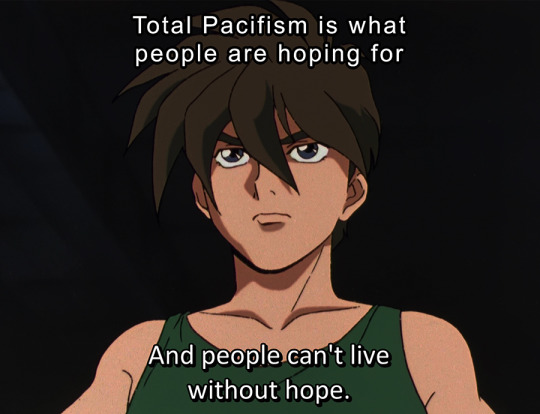
The Sanc Kingdom’s one defense is its total lack of offense. By removing itself as a potential threat and offering no resistance or antagonism to the ruling power, it minimizes the incentive for that ruling power to overrun and destroy it– but there are no guarantees.
Relena pragmatically warns her students that the Sanc Kingdom will never be a safe place until Total Pacifism is adopted globally. She herself is prepared for the likely scenario that advocating for peace will cost her her life. The tenuousness of the kingdom’s position is fully acknowledged by all– how could it not be? The current Sanc is built on the ruins of the previous generation’s bid for pacifism.
Despite this, the kingdom’s doors are open to all; Relena maintains a supremely generous view of mankind that gives everyone the benefit of doubt, continuing within the same logic that non-aggression will be met with non-aggression. Perhaps more accurately, this policy is her way of insisting that this is how peaceful interactions ought to be; despite the considerable risk they incur, both she and her kingdom stand defenseless in a world of grasping military powers, wielding only her dignity, her public visibility, and a conviction that everyone is capable of choosing respectful conduct.
The Sanc Kingdom is perfectly set up for martyrdom– and it is a very short ride before it gets there.
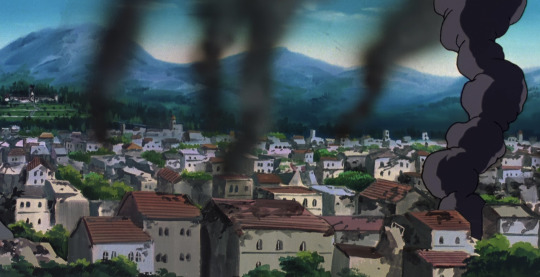
But the power of Relena’s ideals is not tied to the existence of the Sanc Kingdom– it’s not even tied to her, or the Peacecraft name. The naivety, the impossibility, of pacifism in an era defined by global military rule, is constantly reiterated, and yet it does not disappear.
Even as the bottleneck of war grows tighter and the violence between the ever-fragmenting world powers continues to escalate, the majority of people bearing witness to these horrors look to an alternative that offers hope, as practiced and advocated by a brave girl facing impossible odds.
The more pitched the violence becomes, the louder its perpetrators shout that peace is impossible, while to the people suffering its effects, the more outrageous and unnecessary that violence is revealed to be. The ones waging the wars seem to be the ones generating new reasons for them, their excuses becoming increasingly absurd, their justifications transparently thin.
Is it really so absurd or unreasonable by comparison, to take part in an actionable plan for peace?
“I’m aware that my views may appear to be a little naive to some people, but I wonder why people battle if everyone agrees that it’s foolish to do so? I don’t think that we’re too far from the answer.”
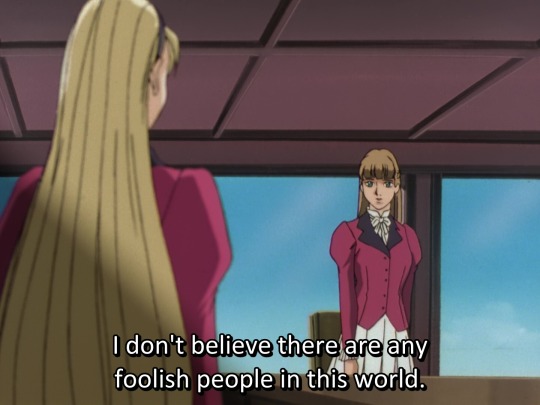
#Gundam Wing#Relena Peacecraft#Sanc Kingdom#After Colony#Gundam Wing Meta#Dorothy Catalonia#Romefeller Eyebrow Brigade#gundam wingtionary#wing watcher's toolkit#parsing post#i can't believe this entry is finally done hallelujah i'm free
80 notes
·
View notes
Text
The ZERO System- Why you shouldn’t let a battle algorithm determine your life goals
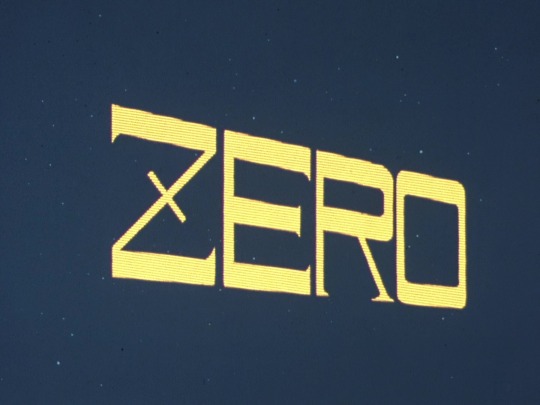

-Arrival (2016)
The ZERO system is a program that interfaces between a pilot and a Mobile Suit.
The purpose of the system is to enhance a pilot’s natural abilities by increasing their reaction time and accuracy, even allowing the pilot to “feel” the response of their Mobile Suit as though it were an extension of their own body, and to provide an adaptive, real-time battle plan that suggests the most advantageous course of action based on accumulated battle data and iterative projections of likely outcomes.
How exactly the ZERO system does all this is a little unclear– but we do know that it’s open-source, DRM free, and runs off a floppy disc.
The future is the 90’s!
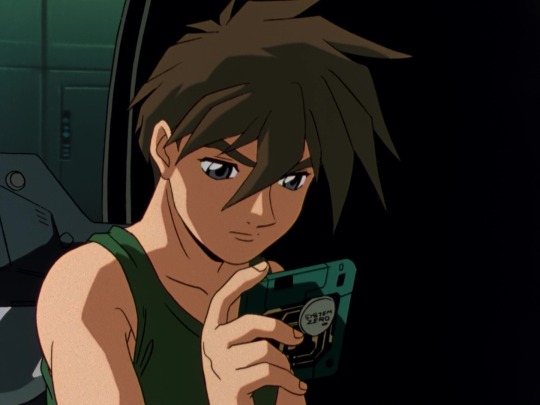
--To start off with a quick overview, there are two mobile suits installed with a permanent copy of the ZERO system: the Wing Zero, which has it built into the cockpit, and the Epyon, which displays the system data via a flight suit helmet (technically the Epyon’s system was reverse-engineered without the benefit of the original ZERO program, but its effects are identical). There is also a modified version of the system that was utilized to coordinate the movements of Libra's mobile doll fleet– a novel use of the technology that elevated the otherwise limited AI of the Dolls to monstrous effect by giving them the intuition and oversight of a human mastermind.
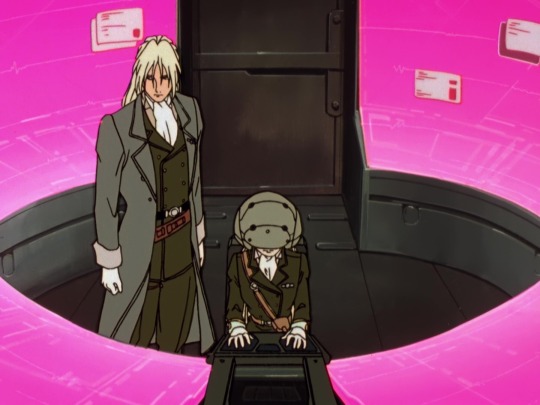
But! Something worth noting is that the ZERO system isn’t the only battle-enhancing algorithm for mobile suits!
In a brief but significant moment in episode 10, we learn that OZ has a machine-learning program all of its own, and it's installed on the (then newly developed) Taurus mobile suits.
“There is a problem with the Taurus. It has the ability to learn from accumulated battle data. I’d like to trust OZ’s control system, but there’s still the chance that the machine will ignore the pilot’s commands and move on its own. If the command to kill overrides the pilot, the consequences could be significant.” –Doctor J
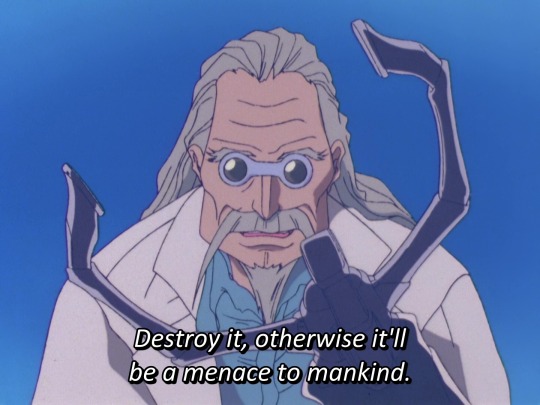
Who wrote the program for the Taurus suits? The most likely answer is Chief Engineer Tuberov, the man responsible for the Mobile Doll AI system, which is no doubt the successor of the Taurus AI. However, there was a lot of cooperation and cross-pollination of ideas between the original creators of mobile suits; Tuberov, Howard, and the five Gundam scientists were all involved in the earliest days of MS development, so it's not inconceivable that Doctor J is aware of the dangers of the Taurus’ AI because he helped develop it.
And Doctor J has good reason to consider the Taurus AI dangerous, because if it’s anything like the ZERO system, it’s the absolute last thing you’d want a power-hungry global military organization to have access to.
It’s not safe in the wrong hands; hell, it’s not even safe in the right hands. There’s a reason ZERO wasn’t installed on the finalized Gundams, and was left buried inside the files of a discarded blueprint.
- ----------------- -
The ZERO system is a GAN : it uses the data sets of previously recorded battles and the pilot's biological feedback to generate potential outcomes for a given fight, and then evaluates those results based on their likelihood and probability of success, in a zero-sum game where "success" is always defined by the total elimination of enemies.
Like all algorithmic processes, it amplifies certain results based on what data it's given and how it is trained; it's possible to use ZERO to predict the most likely, or most advantageous course of action for a pilot's future-- as long as that future is combative. And because the system is only trained to recognize Win States, Enemies, and Vulnerabilities, every future is going to be combative.
It's not trained to look for alternative solutions to combat, or make predictions about a life NOT spent inside a mobile suit-- it can only continue to generate pass/fail scenarios that lead, by the most efficient means, to the ultimate win state: the elimination of all enemies, all future enemies, all potential enemies.
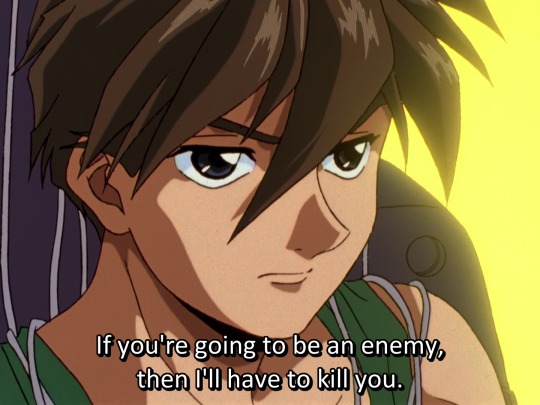
--Whatever the mechanism is that allows the ZERO system to interface with a pilot’s brain, it is possible for a good pilot, who is aware of the system and is prepared for its effects, to mitigate how much control the system has over their mind and body, and successfully moderate the interposition of the machine's priorities and their own-- but it takes an enormous amount of mental and physical conditioning to override ZERO, and the strain on the pilot is significant.
The ZERO system gives a pilot the best chance of success by grabbing them directly by the brain chemistry, heightening awareness, speeding up reflexes, and inducing an almost trance-like state of hyperfocus that eliminates “distractions”, and ignores any physical and mental barriers that might get in the way of victory.
Unfortunately, what constitutes a “distraction” in the eyes of the machine is not always in line with the pilot’s conscience, and what it considers a “weakness” is often the biological feedback of strain and bodily distress. If left unchecked, the system overwhelms the pilot and can make them keep fighting through unsafe levels of exhaustion and injury, and in extreme situations, over-stimulation from the system itself can cause brain hemorrhaging.
While assessing all of the potential outcomes of a given battle, it takes into account every likely scenario up to and including the pilot’s own death. It will tell you if you’re likely to die. It will show you all the ways you are likely to die. If you let it dig too far into your nervous system, it will in fact let you feel how you’ll die, pumping your adrenaline levels up to the screaming pitch you’d experience if it were actually happening.
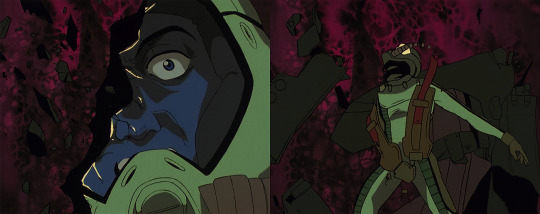
Even if a pilot is technically capable of withstanding ZERO, the psychological effect of using in the first place comes with its own insidious dangers. The temptation to let the machine ride is a powerful one; it makes you faster and stronger than everyone else, it lets you see things before they happen, it allows you to stop thinking about complicated questions of right and wrong and simply focus on the most immediate action necessary for survival and success, it takes away the confusion of competing moral imperatives.
ZERO grants a human the clarity and singularity of purpose of a machine.
For those seeking refuge in numbness, this is a soporific that allows a pilot to take retributive action against their perceived enemy without feeling, removing grief and replacing it with vindication; and for those who are insecure, or weak and hungry for power, it is fatally intoxicating.
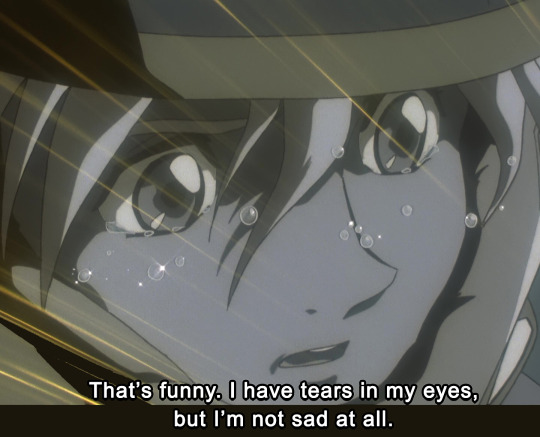
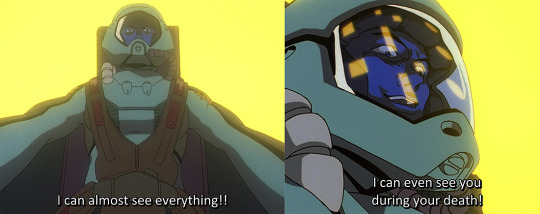
ZERO can only show a pilot the quickest way from point A to point B.
It does not take into account any factors besides efficiency. It does not have a conscience, it does not have external priorities, and it does not value life.
If you give it a problem to solve like “how do I win”, no solution is off the table-- it will remove any and all obstacles in the way of victory, and by far the most common obstacle is the fact that most people have things that they care about, and things they are unwilling to do.
For instance, the safety of one's allies and innocent third parties is not a parameter the ZERO system is equipped to recognize.
If using your beam canon is the most effective way to clear the battlefield but you're not using it because there's a Colony in your line of fire-- well, that's easy to fix. If your concern for an ally is holding you back from fighting without reservation, that's an easy fix too.
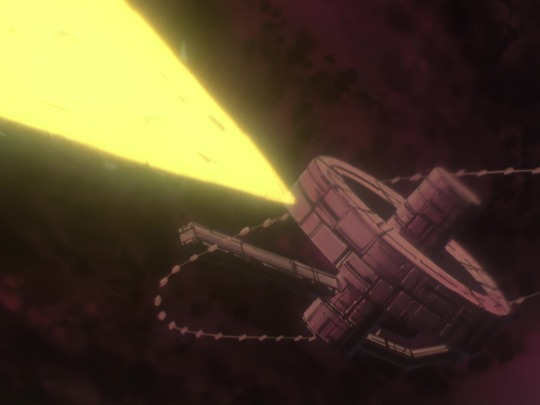
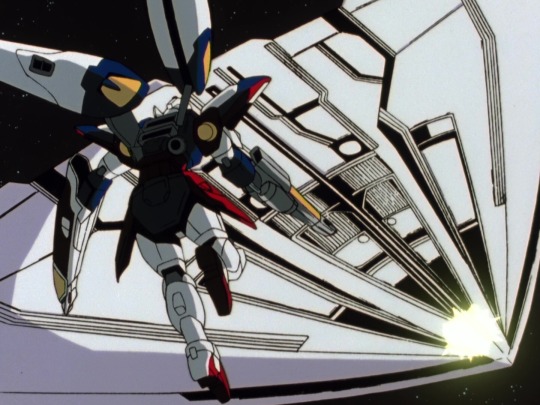
- ----------------- -
The scientists responsible for creating ZERO knew what a monstrosity it was that they had built, and did not implement it in the finalized Gundams. But once it was unleashed on the world anyway, they surmised that the only way to use the system wisely was to become on one’s own terms what ZERO would have tried to force you to become anyway: a soldier with a clearly defined goal, who is strong enough and skilled enough to complete their objectives, and who has nothing holding them back-- therefore, someone who the machine could not easily manipulate.
During their time in space, the Gundam pilots are isolated, scattered, and lack a clear purpose. Their Colonies betrayed them and their loyalties continue to be used against them-- in that atmosphere, the convenience of a system that can select the most advantageous target is obvious, but at the same time, a struggling pilot operating alone is at the greatest risk of being overwhelmed by it. This is why the Doctors advise the pilots to become "perfect soldiers"-- or else, go insane.
Important Clarification: This is a “perfect soldier” in nearly the opposite sense of how the Romefeller Eyebrow Brigade would define a True Soldier!
What the Doctors mean by a “perfect soldier” is simply a fighter with a clear objective and few tactical weaknesses that could be exploited.
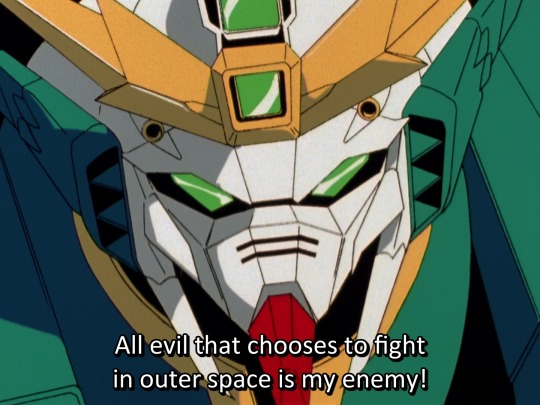
The ideal example of this "perfect soldier" is obviously Wufei:
Wufei already thinks in terms of absolutes; he acts according to the strictest assessment of who is Evil, and therefore an Enemy; he fights almost exclusively alone, relying on his own considerable strength to achieve his goal of enacting justice; and he habitually shuns any close attachment that might complicate his path forward.
It's no wonder that when Wufei pilots the Wing Zero, all the system does is confirm what he already held to be true. His goal was always to eliminate anyone trying to escalate militarism, which means defeating both Treize and Zechs, and as a slight compromise, cooperating with his fellow Gundam pilots as a team.
It’s as though Wufei’s brain was already running on the ZERO system. And since he’s already equipped to make his own tactical decisions in the field, he has no need of an external system to tell him what to do. ZERO has nothing to offer Wufei, and there is nothing for it to exploit.
But it's not just Wufei who can resist using the system: even Quatre-- who is in most ways the polar opposite of Wufei, and who at his lowest point fell prey to the ZERO before anyone realized what it was-- is eventually able to master the system. Once Quatre is armed with the knowledge of what the system is intended for and knows exactly who he has to fight, he is able to use it in a way that maximizes his natural tactical abilities, and resists all its negative effects. And upon gaining ZERO's insight, Quatre realizes that he, too, no longer needs it.
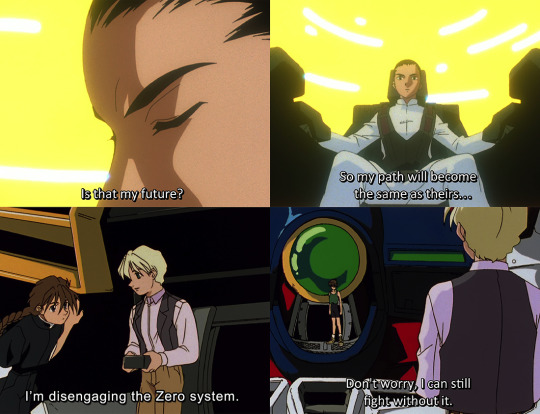
- ----------------- -
So what it boils down to is this: A pilot with superior skills and a firm resolve can operate effectively without the ZERO system, and a pilot with superior skills an NO firm resolve, or with too many vulnerabilities, will find themselves struggling against it to their detriment.
Either way, it is up to the pilot to navigate the available outcomes presented by their surroundings, and choose the best course of action according to their logic and intuition-- and wouldn't this still be true with NO artificial source of input?
The ZERO system may enhance human abilities by brute force, but the processes it accelerates are already present within the pilot. In fact, it’s hardly more than a limited, mechanically-accelerated version of what the senses and nervous system do already.
Like all current examples of machine learning, it presents the illusion of an objective, autonomous process that can stand in for human input. But it isn’t a true “artificial intelligence”-- and even if it were, it would not “transcend” or replace the need for human input. It is only a means of sorting and arranging data sets that come from humans, and must be interpreted and acted on by humans, in order to have any physical effect.
--We know a lot more about the dangers of algorithms and machine-learning and automation now in the 2020’s than we did in the 1990’s, but between the ZERO system and the Mobile Dolls, I think Gundam Wing did a damn good job of illustrating them.
Ultimately, it is always a human who makes the decisions, and is responsible for the consequences. Surrendering that responsibility to a machine is not only morally reprehensible, it is in fact, not possible– a human built the machine, and a human made use of the machine, and a thousand, thousand collective moments of human decision-making led to whatever outcome the machine facilitated.
The world hasn’t yet arrived at the techno-singularity, either in the present or in A.C.195, and those who are eager to pass the blame prematurely to “AI” are usually those who wish to avoid being held accountable for their actions.
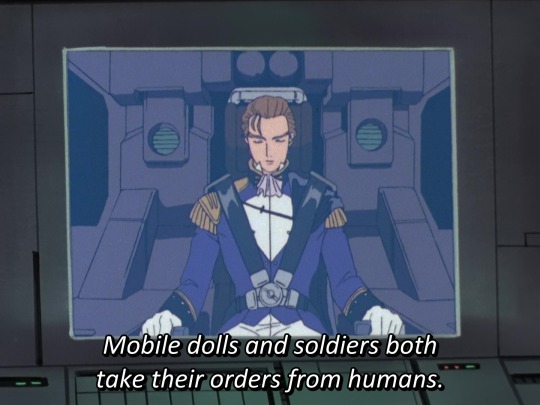
Perhaps it’s no surprise that the only person to use the ZERO system for something other than combat is Treize. For the confined leader of OZ, the system is a magic eight ball to scry the future with.
At the time of creating the Epyon, the system did not show him a viable path forward, or at least, not one he considered acceptable. Treize interpreted this as meaning he had NO future, but I can’t help but wonder if he was asking the wrong sort of question for a predictive battle algorithm to answer.
...Or maybe, the answer he got was “Ask Again Later”, which, actually, would have been correct.
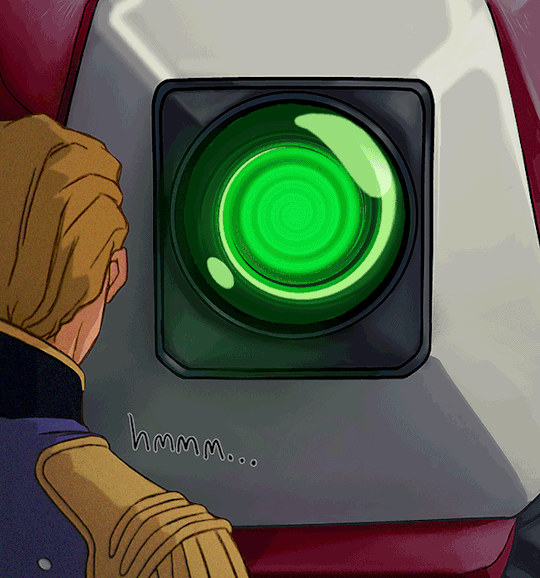
#gundam wing#ZERO system#Wing Zero#read to the end for a surprise!#parsing post#gundam wingtionary#wingwatcher's toolkit#art by me
66 notes
·
View notes
Text
“True Friends” - Understanding Mr. Treize and the Contradictions of OZ
“Treize himself has a tremendous disdain for any tactic that allows for excess casualties. Ignoble behavior on the battlefield sullies any victory, and civilian death makes a mockery of what a True Soldier fights and dies for. For Treize, there is nothing more hateful than removing the human component from battle, or the cowardly avoidance of responsibility for human death.”
Gosh! What a great quote! I wonder who said that? Oh right, that was me! I did. I wrote that in the entry about “True Soldiers: Aesthetics, Honor, and Chivalry”.
Let’s examine that a little more, shall we?
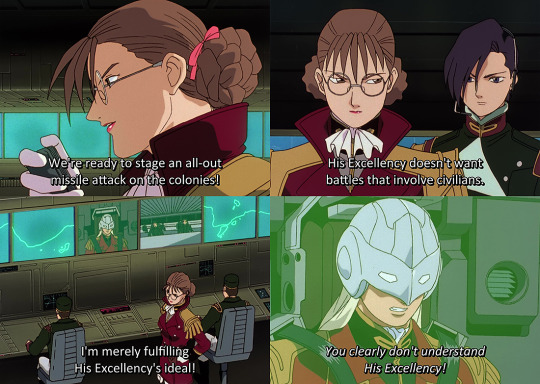
“His Excellency doesn’t want battles that involve civilians.”
Everyone who knows Treize best, his “True Friends”, who grew up with him, who were trained by him, who understand him, all seem to agree: His Excellency wouldn’t stand for needless casualties. OZ may be ruthlessly pragmatic and underhanded, but that couldn’t be Treize’s fault– no, it’s always Lady Une! It’s his fanatically devoted colonel who always chooses the path of greatest violence, heedless of any collateral damage– she’s the one to blame! Treize would never give an order that risked civilian lives.
…Right?
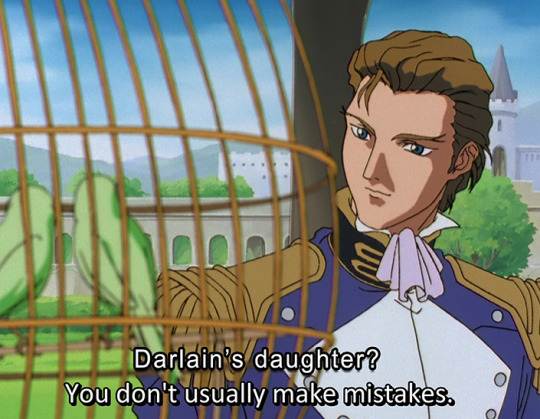
…Right?
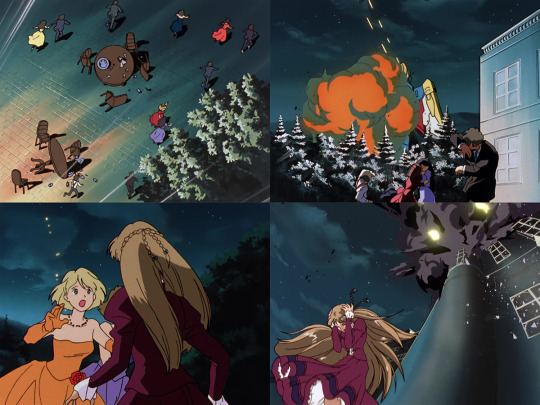
Surely he would stop her, admonish her, make her face serious consequences for the atrocities she was willing to commit. He’d leave no room for doubt that she had failed him and disappointed him.
...Right?
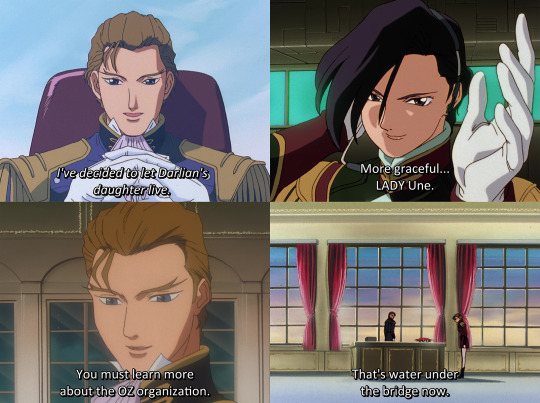
Yeah, that’s right, a firm slap on the wrist oughta do it. Tell her to try a little harder next time to understand the value of human life. Just do better! It’s alright to use mobile suits to attack a school, but we’re going to put a stop to it because I’ve changed my mind about killing a teenage girl, as a personal favor to a friend.
–Friends of His Excellency would certainly like to believe that he would never knowingly sacrifice civilians, but he sure doesn’t seem to mind benefiting from someone else doing it for him.
How well do Treize’s friends really understand him, when they seem unaware of how wide a margin of error he finds acceptable in pursuing his ideals?
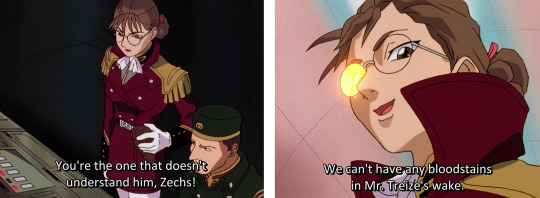
Well, ideals are fine and all, but war is war, and some amount of pragmatism is necessary to stay on top. Treize isn’t the one calling all the shots (yet), and the organization he reports to expects results. You have to break a few eggs to make an omelet, right? That’s why it pays to have a Chief Omelet Maker working for you, so she can break all the eggs, and murder school children, and threaten nuclear assault, and you can come away still smelling like roses.
…But what sort of effect does that have on her?
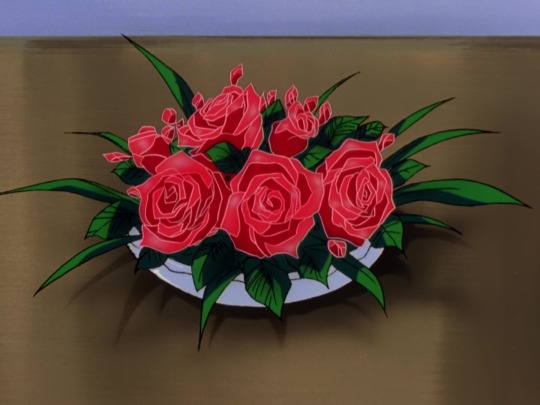

It’s better for a ruler to be feared than loved; being hated is the perfect motivation to stay strong; fighting will never disappear from the world, so the strong should rule it for the sake of damage control; God was too lenient when he gave mankind the free will to rebel; people find comfort in being controlled by the powerful.
--These are some of Treize’s stated ideals.
So Lady Une devotes herself to fulfilling those ideals unflinchingly, no matter how much blood ends up on her hands. Better her hands than His. OZ has to be the strongest. OZ has to win. OZ must be victorious at any cost. Damn the Colonies, damn the politician’s daughter who made herself a liability, damn the wounded soldiers left behind at New Edwards Base– she’s going to make OZ so absolutely unfuckwithable that their enemies shit themselves at the mention of its name, and she’ll do it herself if no one else will. Because THAT is what His Excellency wants. She understands him.
...So why does he keep telling her– ever so gently, ever so gracefully, that she’s wrong? If making sure the strongest rule and the weak obey isn’t what pleases him, then what will?
Killing is simple– anyone is capable of killing anyone, so you mustn't abuse that capability. The Earth is fragile and infinitely beautiful. Human life is fragile and infinitely beautiful. One must always take responsibility for the fates of those who fight for you, and honor the sacrifice of those who die. Tragedy in war is inevitable.
--These are some of Treize’s stated ideals.
So Lady Une devotes herself to fulfilling those ideals with grace and empathy, to bring an end to needless bloodshed. The world needs a strong, compassionate leader, who is capable of loving humanity and guiding them to a peaceful future, where loss and war are tragedies of the past. Order and peace can be maintained without sacrifice, by using technical advancements to replace soldiers on the battlefield and keep them out of harm’s way. That is what His Excellency wants. She understands him.
...So why does he tell her– so sadly, plaintively, that she is wrong? That he is not who she thinks he is, that the future she has so carefully laid out for him is a fantasy of her own making? Why does he plead with her to come back to him, as the person he once knew so fondly?
Civility and honorable conduct on the battlefield is worth more than victory. To fight for something one believes in with perfect clarity is the purest endeavor of mankind. The tragedy of loss is what gives a battle meaning. Honoring the sacrifice of those who have died for your cause means being willing to die for it yourself. To fight, to lose, to die for a noble cause is to move the hearts of all humanity, to touch immortality.
--These are some of Treize’s stated ideals.
And so she does– she sacrifices herself to save the Gundam pilots and turn the tides in outer space, rejecting Romefeller, rejecting the Mobile Dolls. At last, she understands him.

…But didn’t she always?
Except perhaps in the case of using Mobile Dolls to replace soldiers (an idea that was easily manipulated by its inventors to fit into her worldview at the time), her understanding of Treize’s ideals wasn’t ever wrong, just fragmented. She focused on a single facet at a time, each time excluding the contradictions of the other sides– light bouncing off a solid plane without revealing the rest of the prism’s convoluted geometry.
She isn’t mistakenly interpreting him– HE is a mess, and she is representing him accurately, one dimension at a time.
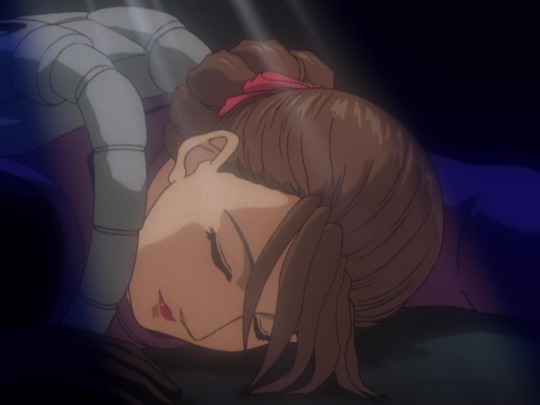
What is more significant is that he finally understands this about her.
Treize is mortified to realize what sort of effect he has been having on someone he cares about, during a period where he is questioning the validity of his own beliefs and significance. He may mistakenly believe that he is responsible for having fragmented Lady Une’s personality– which is not how the condition she has operates– but he is not mistaken in taking responsibility for her distress, and the danger he has put her in.
Losing her, or believing that he has lost her, is devastating. Rather than moving him to action, it moves him to inaction; aware that he has come to represent ideals that are too easily manipulated by people who he fundamentally disagrees with, that the idea of him is too powerful to be used responsibly by the current rulers, he withdraws.
Treize cannot switch off the magnetic field of his charisma or its continuous pull on the soldiers who take inspiration from him, but he refuses to willingly lend himself to a cause that he finds irresponsible. In fact, he refuses to join any cause until one presents itself that he can have complete faith in– and complete control over.

The people whom Treize considers his True Friends are the ones who “understand” him– this includes his enemies, the ones who oppose him but nevertheless espouse values that he can respect. In fact, ANY strongly held ideal, even ones in opposition to him, and ANY display of courage, is more admirable in Treize’s estimation than lip service to his own ideals or those of his organization. The “fighting spirit” that is of paramount value in his worldview is not limited to combatants– he expresses immense respect for Relena Peacecraft, more so even than his respect for the Gundam pilots, who he comes to idolize. What matters is the strength of conviction. What matters is courage.
He respects and admires Lady Une, even when her errors in judgment have megaton consequences, because she is so singularly and ferociously dedicated to her goals. He tolerates the violence and inhumane actions of the Specials and OZ soldiers because they are fanatically ambitious and ready to die for their ideals. As long as the ultraviolence isn’t cowardly or self-serving, then Treize can and will overlook the body count– noble sacrifices, all. He’ll memorize their names later on today.
Treize’s ideals are flawed and contradictory. There is a tipping point in the series where he gains enough self-awareness to recognize this fact. This does not stop him from believing in his ideals– he can’t simply turn away completely from what he values and loves about humanity and its “fighting spirit”– but it does allow him to appreciate those who see his hypocrisy for what it is, and who despise him for it.
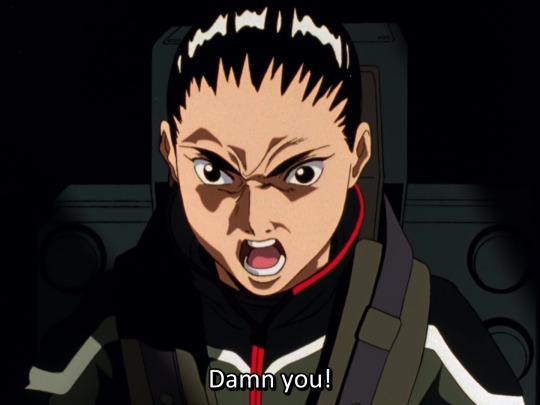
“You’re only capable of looking down on others; you’re only fighting to satisfy your ego. How many people have died because of you?”
The fact that Treize has memorized the names of all 99 thousand people who have died for him does not do anything to improve Wufei’s opinion. For Treize, that number is a sacred personal burden; to Wufei, it is evidence of offensive, monstrous egotism.
Wufei, of all the Gundam pilots, is best acquainted with how wide the margin of error is in Treize’s ideal of chivalry. Nataku herself, the namesake for Wufei’s gundam, fell neatly into that margin and died in it. Long before they met and dueled, Wufei knew of Treize as the OZ official jointly responsible for an attack on his Colony. While General Septem of the Alliance (then in control) would have murdered everyone on the Colony indiscriminately with biological weapons, Treize’s solution was more sporting: OZ sent in Mobile Suit troops to directly eliminate the rebel element, who were armed with nothing but a single decrepit prototype Leo and an unfinished Gundam with no ammo-- a much more chivalrous way of sterilizing a Colony, allowing the largely unarmed group of dissidents to die fighting rather than be killed with the push of a button.
Would the deaths of the Long Clan have been meaningful sacrifices in Treize’s eyes? Was exterminating civilians for the sake of convenience a noble cause to fight for?
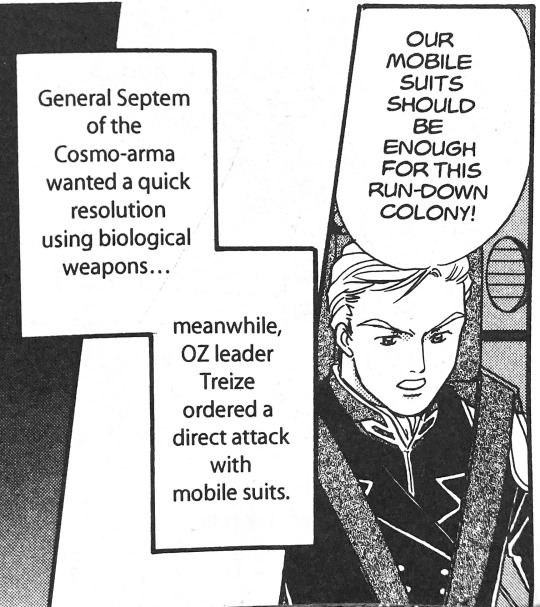
One could argue that the existence of the then-in-development Gundam was enough of a threat to justify an attack, but at the time the idea of gundanium mobile suits was no more than a rumor. Could Treize, back on Earth, have reasonably predicted its invention?
Not if we are to believe his own words, which clearly indicate that the Gundam’s existence was unknown to him until reported after the attack.
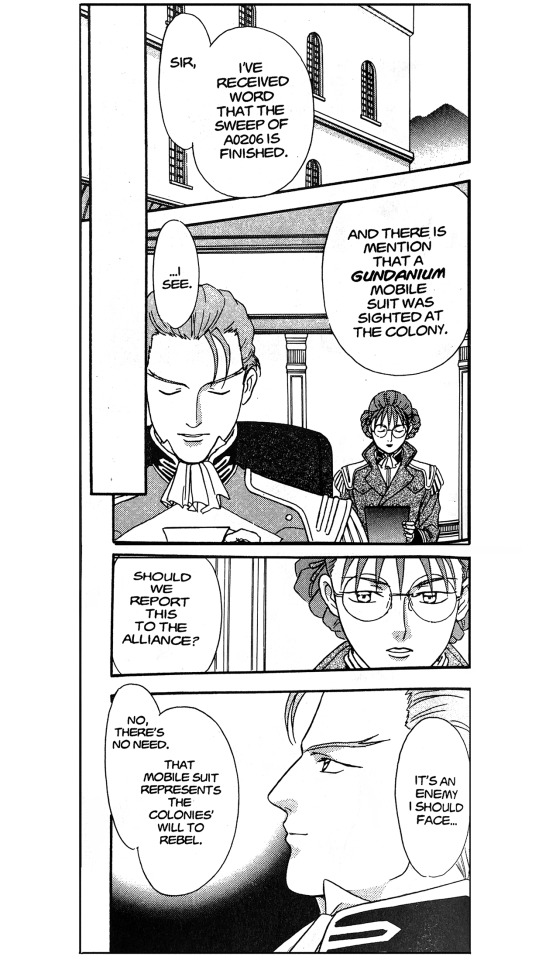

For those who fall outside of his cult of personality it is easier to see past the charisma to the reality: no matter what his soldiers think of him, Treize is not a god. He is only a man, and no one person has the right to decree some deaths necessary to the future.
–And Treize, for his part, would agree. He is a single individual, whose ideals people put too much faith in without fully realizing the essence of what they mean. But the belief people place in him gives Treize a level of power that must be acknowledged and used responsibly, and to the best of his ability, he tries to use it for the good of Earth and humankind.
As a symbol, he is far more influential than he could ever be as a man, and his awareness of that fact leads him to choose the path of martyrdom, knowing that his very existence is a threat to peace. The only way he can neutralize his own power as a military icon is to join the sacrifices to the cause. And what more iconic way to do that than with a duel?
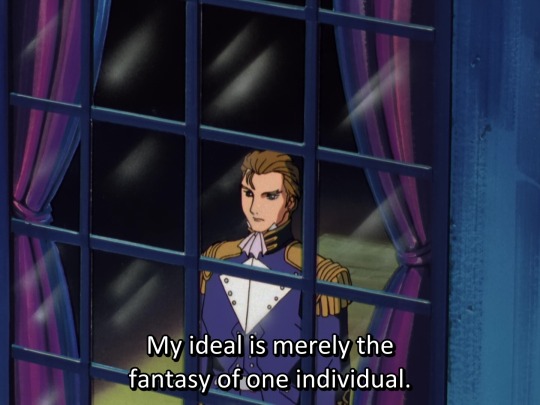
Treize may have resigned himself to being an anachronism and a dreamer, but if he is going to die for the sake of the future, he will at least go out according to his ideals: gracefully, nobly, at the hands of an enemy he respects.
For personal and aesthetic reasons, Milliardo is Treize’s hopeful first choice as a dueling partner, but Milliardo had his own role to play in their final performance, which prevented him from participating in a duel for their mutual actualization. So Wufei is the right choice; Wufei both understands him and has a justified reason to want him dead. Besides, it’s an elegant, symmetrical solution– the continuation of a duel that he predicted they would be destined to finish in mobile suits.
--And what effect does that have on Wufei? Perhaps expectedly, a fracturing one.
It shouldn’t be surprising that Treize’s ideals resonate so powerfully with someone who was raised in a warrior culture, especially someone who only knows how to express his beliefs and sense his self worth through combat.
Wufei, too, lives with contradictions that he cannot fully unify.
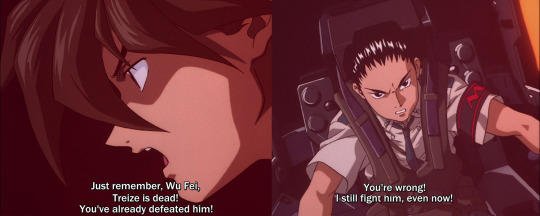

Treize Khushrenada cannot live in the world he wishes to see realized.
If he were to win the war against White Fang, the cycle of oppression and resentment would continue. Even if he were to immediately relinquish his power to Relena and demilitarize the Earth Sphere, the end result would lead to more conflict; his refusal to take control of the Colonies would be seen as capitulation, and a betrayal of those who fought for him against the threat of annihilation from space. Even the considerable power of his charisma would evaporate overnight if he were to appear to be turning his back on the soldiers whose fanatic loyalty had allowed the unified mobilization of Earth’s military forces under his banner. But, as a general leading from the front lines in a noble defense of Earth, dying gloriously in battle for the sake of peace lends all that charisma to the future he fought for.
--The message left to the surviving soldiers is not: “His Excellency led us into battle and then abandoned us when he won”, but instead: “this is the peace His Excellency died protecting.”
Indeed, after his death, Treize’s name IS used in an attempt to lend legitimacy to the argument that soldiers have been devalued in a time of peace, and that continuous war to determine the strongest victor to lead humanity is his true legacy. But it doesn’t stick– the would-be dictator who tries to use Treize’s name in service of his military takeover is killed by a nameless soldier, whose change of heart is motivated by the memory of what Treize actually died for.
--It is not a victor who moved the hearts of the people, but a glorious loser.
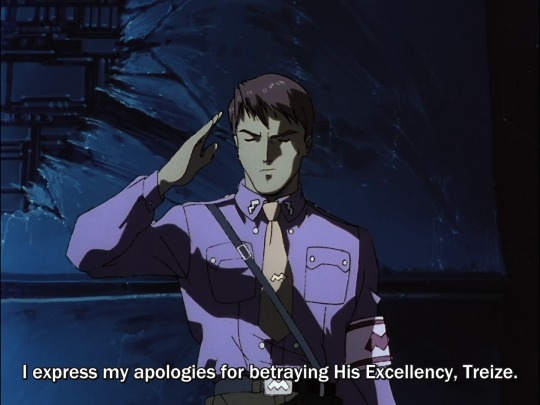
#Gundam Wing#Treize Khushrenada#Lady Une#Chang Wufei#Endless Waltz#gundam wingtionary#wing watcher's toolkit#tinyozlion pgw#parsing post
64 notes
·
View notes
Text
“True Soldiers”-- Aesthetics, Elegance, and Chivalry
What it means to be a soldier, and what fighting means to humanity, are questions that dominate the characters of Treize Khushrenada, Zechs Merquise, and Dorothy Catalonia– the Romefeller Eyebrow Brigade, if you will. (Zechs is an honorary Eyebrow. He was socialized an Eyebrow).
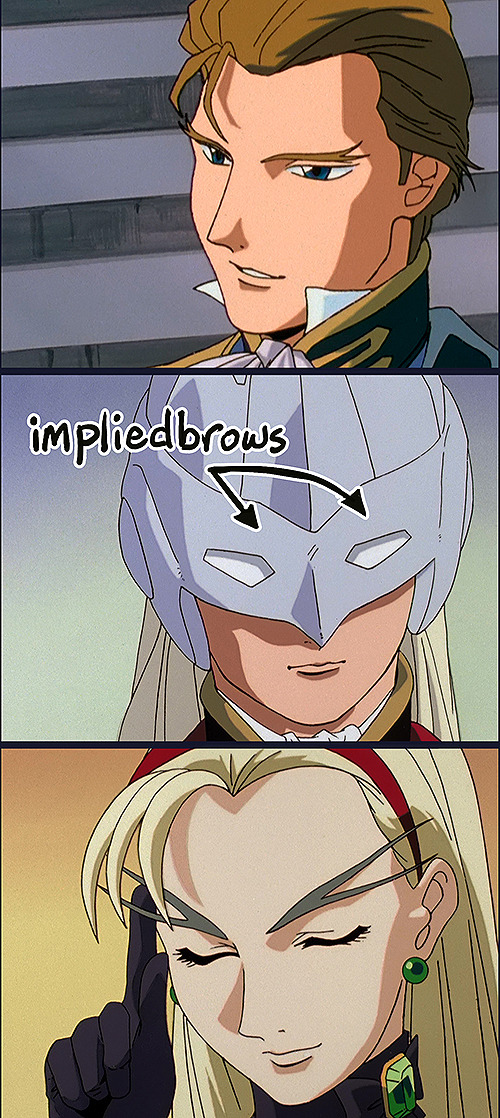
“True Soldier” is the term we’ll use here, though the idea it embodies has a lot of synonyms in the series that are all used interchangeably (much like “peace” / “true peace” / “pacifism”). "Soldier" is actually a bit misleading, because in this context it does not come with any of the associations of service, or being part of a unit, or being aligned with a military organization in general. A "True Soldier" is the same as a “warrior”, a “fighter”, or sometimes just "soldier". If the characters are waxing particularly Eyebrow-y, you might even get “knight” or “hero”.
Even though the series still uses "soldier" in its usual definition (i.e. a person serving in an army), it’s usually pretty obvious when a character is talking about True Soldiers™ in a meaningful, Gundam-specific way.
Really, it is Treize for whom the questions about the meaning of fighting and humanity are paramount– both Zechs and Dorothy, who grew up with him as friend / family, are drawn into his ideology by the gravity of his personal charisma. The pull of Treize’s ideology is so powerful, in fact, that Zechs spends a significant amount of time trying to escape from its orbit, and repeatedly fails.
For Zechs, the essence of being a “True Soldier” is to fight for a personal, often intangible victory: to test one’s own limits, to honor a worthy opponent, to find meaning in struggle, and ascension in victory. He fights to test himself, but also, significantly, to achieve his personal aim of avenging his family and fallen country. Whether he wishes to fight as Treize’s chivalrous knight to attain personal clarity, or to fight earnestly in the defense of what is in need of protection, is a duality that he struggles to reconcile. But his perception of what makes a True Soldier remains: someone who fights for a meaningful cause. Or aretḗ, if you will (and you will, because that’s the best definition for what both Zechs and Treize consider “honor”, or “nobility”.)
Treize takes this a step further: for him, a True Soldier not only fights for something beautiful, whether to better themselves or for a selfless cause, a True Soldier puts their life on the line to give meaning to that conflict. The more one is willing to risk in battle, the purer and more noble the fight is, the more potent the sacrifice. In that sense, to lose the fight is to have the greater victory of experiencing martyrdom. He does not glory in death, but he finds immense, incalculable value in the deaths of those who die fighting. To Treize, dying for something noble is akin to apotheosis.
Compare this to Wufei’s conviction that only the strong can or SHOULD fight, that losing is a sign of weakness and weakness is a sign of inferiority. The weak gain nothing from fighting, because they will only die. For Treize, there is power and dignity in losing a hard-fought battle for something one believes in. For Wufei, losing is a disgrace that bars you from the right to take up arms and fight. It’s easy to see why Wufei and Treize see one another as their rightful nemesis, stuck in each other’s orbit.
Dorothy, meanwhile, cares much less about avoiding casualties or fighting with civility; to her, ALL death is a glorious sacrifice, part of a means to an end. ALL fighting is equally fascinating, equally awe-inspiring. People who profess to hate war, yet fight against it? Exquisite! Divine! Relena is just a delicious vector of contradictions that causes people to fight and die for her, despite hoping for an end to death and fighting! What priceless drama war provides. Man is a fighting animal and it is only through conflict that we find meaning. War is disgusting. Man is disgusting for loving war. The two deserve each other, they will go down in flames together, locked in passionate embrace. How absurd, how obscene, how beautiful.
It is worth noting that the one time Dorothy balks is when Zechs aims to annihilate Treize with the Libra cannon, eschewing noble combat in favor of brutal overkill– a move that was necessary to prove his dedication to the role of Earth’s villain, who would not be swayed by previous personal attachments. It is a move so counter to everything Dorothy believes in that her otherwise iron resolve cracks. To her, Treize represents the ultimate ideal of nobility in fighting, and also the perpetuation of fighting– destroying a beautiful, doomed knight with the mere push of a button? The same gutless, impersonal tactic that Mobile Dolls embody? Even for the sake of Zech’s war to end all wars, she cannot abide this.
In Treize’s ideology, war is merely the condition that allows humankind to express their natural desire to fight. But Treize himself has a tremendous disdain for any tactic that allows for excess casualties. Ignoble behavior on the battlefield sullies any victory, and civilian death makes a mockery of what a True Soldier fights and dies for. For Treize, there is nothing more hateful than removing the human component from battle, or the cowardly avoidance of responsibility for human death. How many people have died for him? He’ll tell you the exact number. He’ll also tell you that none of them died in vain. Because if there is no sacrifice in a war, no willing risk of human life on both sides, then it is a meaningless slaughter; it allows for no end state, no ideals, only murder and subjugation by those unwilling to risk their own lives.
“Wars with no civility only give rise to massacres.”
…And, well, that’s stupid, isn’t it? The absolute assurance that only willing participants will be at risk, the guarantee of zero unintended casualties, and total adherence to civility in a fight, are the traits of a duel. And for Treize and (for a time) Zechs, wars ARE duels, or they ought to be.
But that’s not how wars operate, and they never have.
Countries pitting armies against each other for sport and glory leads to trench warfare and mustard gas, not knights saluting each other across a pristine field. And whether knights as a rule ever did battle this way in the first place is pretty dubious. Knights were knights because they could afford to be in the literal sense: they had money for armor, for destriers, and time to spare on training rather than farming. In Europe, knighthood and chivalry are joined at the etymological hip: they both stem from the state of being a nobleman in the military who fights on a horse, while the so-called "chivalric code" is a much later invention. Chivalry as a code of honor is inextricably bound to the ideals of medieval Christianity and romanticization of the Crusades. Just like any Golden Age, the romantic Age of Chivalry can’t be found anywhere in history except “back in the day”-- but an age of knights and paladins certainly did exist, and I challenge you to look at any account of the Crusades and come away with the idea that they were cleanly, noble, justified affairs. Literally the first entry of the Crusades is a civilian massacre.
If a mounted knight did maintain a policy of eschewing personal combat with a weaker, unarmored opponent, it would be because there would be very little need to do otherwise. A lone peasant infantryman doesn’t present a significant threat to heavy cavalry– in medieval terms, those are tanks. Would “chivalry” in this context just be the ability to afford discretion on the battlefield? And would that chivalry make much difference to the total body count of a war?
Wars, even preceding the modern concept of Total War, do not typically go out of their way to tread lightly on civilians. Indeed, historically civilians were by far the most typical people involved in wars. The professional full-time military is typically credited as being the invention of the Roman Empire, which again, could afford to devote a huge populace of able-bodied men in their prime to something other than agriculture and labor. (…And if you bring up the Spartans, I swear to god, I will put a curse on your house. Of course the highest of the elite aristocracy can devote themselves to full-time combat training when more than half the population of their city-state consists of slaves forced to take care of every other activity needed to sustain society).
Wars tend to come to a natural conclusion when one side stops having enough civilians to throw in the meat grinder and still have a country left over afterwards, so finding cost-effective ways to wipe out civilians and soldiers is usually a primary objective of the people funding and providing the impetus for wars (less so for those making money off of the continuous demand for weapons– i.e. Romefeller). Efficiency makes wars end faster! And efficiency is a great excuse for justifying massacres; it is WAY less conducive to justifying civility.
Hawkeye: War isn't Hell. War is war, and Hell is Hell. And of the two, war is a lot worse.
Father Mulcahy: How do you figure, Hawkeye?
Hawkeye: Easy, Father. Tell me, who goes to Hell?
Father Mulcahy: Sinners, I believe.
Hawkeye: Exactly. There are no innocent bystanders in Hell. War is chock full of them - little kids, cripples, old ladies. In fact, except for some of the brass, almost everybody involved is an innocent bystander.
--M*A*S*H, 1972
“There’s no formality when it comes to killing men. If there were, it would be in the form of a game where people’s lives are toyed with. In war, a frenzied death is the most honest way.”
Relena does not see war through the rose-colored glasses of the Eyebrow Brigade. What do “chivalry” and “honor” even mean in a war? An individual can maintain a code of honor– but unless you somehow ensure that everyone involved, from general to recruit, is fighting for the same reason, using the same rules, in the same manner, an army can’t. Unenforceable moral aesthetics applied to the actions of armies are a farce that puts a pretty bow on state-sanctioned murder. It’s propaganda.
But if you’re fighting a losing battle that you believe in, you don’t have the luxury of chivalrous conduct– you can still have a conscience, but you don’t take time out to make sure you and your opponent are evenly matched and emotionally on the same page before engaging. If you’re protecting something, or resisting oppression, you fight messy and kill when you need to and die in whatever ugly position you land in, because you have no other choice.
That’s how the Gundam pilots fight. It’s desperate, and brutal, and inglorious every step of the way. Whether they win or lose they keep fighting, because that’s what they have to do to be the catalyst of change. They put everything on the line: their lives, their dignity, their reputations, their identities, and when they fight, they lose over, and over, and over again.
--And the Eyebrow Brigade is OBSESSED with them for it.
The Gundam self-detonation is a shot heard round the world. It isn’t as if the members of OZ have never seen people sacrifice themselves before– Zechs has several martyrs on his conscience already. But there is nothing to soften the impact of seeing the enemy war machine open up and reveal a child as its pilot, and then watch him unhesitatingly press a switch to self-detonate. They backed their enemy into a corner and gave him an unthinkable ultimatum, and instead of choosing, he rejected the dichotomy entirely and took himself out of the equation. Without blinking. They watch a 15 year old die rather than acquiesce to atrocities, and everything they’ve done in the war to that point is lit up in the unforgiving floodlights of that act. Even if they still half-heartedly believed in the “liberation” OZ had given the Earth Sphere, was it worth this? If this was the opposition, who were they?
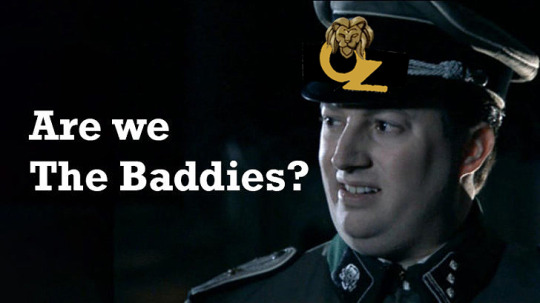
If a True Soldier is someone who puts everything on the line for their purpose, who sacrifices themselves to give meaning to their fight - then they’re looking at him. What’s left of him.
Zechs’ fight with the Gundams changes his perspective so thoroughly that he throws away his entire military career. It’s not just his job– it’s the career he compromised his Peacecraft identity for, the career that offered him security as a political exile, as well as fame and self-actualization.
He wants so badly to achieve that state of clarity the Gundam pilots have that he rebuilds Heero’s Gundam just so they can continue the fight, so Zechs can learn what makes a Gundam pilot tick. He tries to force himself to fight without civility, to try and escape his own dependence on aesthetic combat. The irony is not lost on him that he is staging combat in order to do away with the formalities of staged combat– but he’s still unable to avoid it.
Noin, being the smart cookie of the couple, already gets why people who fight for something tangible have clarity. SHE has that clarity– she fights for Zechs, and for Relena. She knows that Zechs is perfectly capable of that clarity himself, because there are things and people dear to him that absolutely need protecting! But she also knows Zechs well enough to know he has to realize that for himself. No amount of persuasion can get Zechs to change direction once he’s committed– only blunt force. (The people who know him best seem to all understand that, except for Relena, because Relena is a chip off the same stubborn-ass Peacecraft block.)
His fight with the Gundam pilots shatters Zechs’ confidence so profoundly that eventually, he’s forced to take off the rose-colored glasses he’s been wearing ever since he and Treize became friends. He is suddenly aware of how shallow his honor is as a “knight” fighting for nothing except his own betterment, a puppet of an organization with no guiding principles.
Treize’s change of mind takes longer; it’s a slow erosion, not a shattering. His ideals are so intrinsic to his sense of self that changing requires him to kill his ego and voluntarily exile himself from the world stage.
The bravery, the tenacity and selflessness of the Gundam pilots is such a perfect demonstration of his ideals that it begs the question: Why is HE fighting? What was it he had wanted to create with the Specials? Knights on the battlefield who could operate according to their will, yes– but with no clear objective to fight for besides being the best? Was eradicating the Alliance– so offensive to him when it was in power– worth his involvement, when its successor had run out of patience for him, and all his inconvenient ideals about civility and sacrifice in war?
The Gundams, and their proponent for peace in the Sanc Kingdom, are the ones truly fighting for what is beautiful and good, and therefore truly living. And what has he done? What is he doing? It’s impossible for him to lend his support or his influence to the organization that backed him in his rise to power. To do so any longer would be to betray his most fundamental beliefs– unacceptable, even when cannot live according to those beliefs himself.
Treize struggles to find his own purpose in a new world of dehumanized warfare, and his isolation and turmoil do not end until Zechs presents him with the opportunity, at long last, to fight for his ideals– and die to give them meaning.
Zechs and Treize never truly abandon the ideal of the “True Soldier”. Their beliefs evolve, and in Zechs’ case must be disguised, but the belief itself– in that chivalrous, virtuous battle that ennobles humanity– persists in a more self-aware state until the end of the war. It’s the very thing that allows them to commit to sacrificing themselves for the sake of a peaceful future they cannot participate in.
And the Gundam pilots, continuing not to care what kind of soldier they may or may not be, changed the trajectory of their enemies so dramatically that they found themselves traveling in the same direction. In the end, the victory they’ve been looking for is their own redundancy– nothing more and nothing less than the ability to simply stop fighting.
(…Except for Wufei, because he’s… well, it’s complicated. But we'll get to him.)
#parsing post#gundam wing#treize khushrenada#zechs merquise#tinyozlion pgw#Wing Watcher's Toolkit#Gundam Wingtionary
57 notes
·
View notes
Text
“The Soul of Outer Space”: Quatre and the question of Newtypes in GW
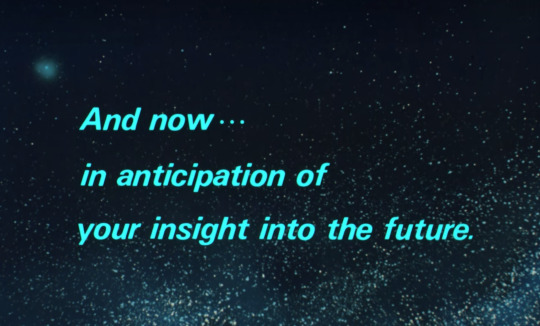
Newtypes are a concept from the Mobile Suit Gundam series; the term refers to a generation of people who were born during the age of space habitation who have developed certain telepathic, telekinetic, empathic, and even precognitive abilities to widely varying individual degrees. They are considered a new phase of human evolution, better adapted to life in space because of their unique capabilities.
The precise details of what makes a person a Newtype are intentionally left a little mysterious. The most common Newtype characteristic seems to be the ability to sense the “pressure” of other Newtypes, though the exact identity of the other person is typically an unknown factor-- this is evidenced by the fact that whenever someone with Newtype abilities senses another, their first response is usually to try and guess based on vibes who the source of “pressure” might be. People frequently share a similar "feeling" that can be mistaken for someone else, particularly if they have personal traits or life circumstances in common.
Newtypes can usually detect powerful emotions and subconscious intent from anyone in proximity, regardless if those people are fellow Newtypes or not. Some especially powerful Newtypes develop the dangerous ability to invade or even alter the minds of other people, though this is very rare.
Another common ability of Newtypes is an increased awareness of their environment in all directions. In some cases this is accompanied by minor telekinetic properties that allow them to guide or move objects in their surroundings, though this is usually limited to machines designed specifically to respond to brainwaves. This extrasensory capacity makes Newtypes exceptional pilots, able to feel the movements of their craft as if it were an extension of themselves and easily navigate through space.
However, what is of greatest importance about Newtypes is their ability to immediately understand and empathize with other Newtypes simply by making a mental connection with them. Communicating on a wavelength of pure emotion and thought creates an intimate and deeply personal connection between Newtypes without their needing to speak or even meet one another.
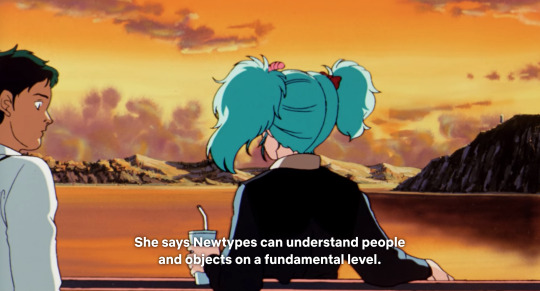
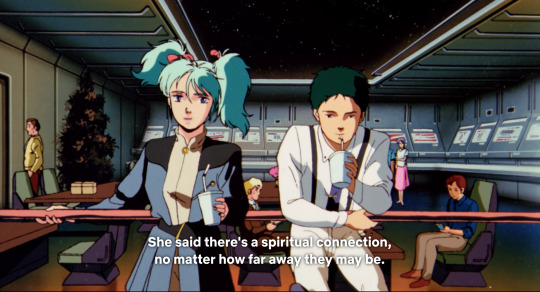
Newtypes connect to each other via their emotions, their memories, their minds, their selfhood– things that together one might describe as the soul of a person. When a Newtype dies, they leave behind an impression of this soul that can continue to be accessed by other Newtypes.
…So why the hell does anyone care about their psychic powers? Newtypes can literally transcend death--
--at least in a very animistic sense that assumes all things leave behind an impression. But Newtypes in particular seem to leave behind very distinct presences after they die, which can interact with other Newtypes and retain their individual identities for a long time before returning to the universe, presumably at will.
The idea of oneness and harmony underlies the concept of Newtypes and their role in the world: they can instinctively understand with each other because they are not different entities in the grand scheme of things; they persist after death because all things persist after death; they can connect seamlessly with their environment because they are not separate from their environment; they can grasp the future because all time exists simultaneously.
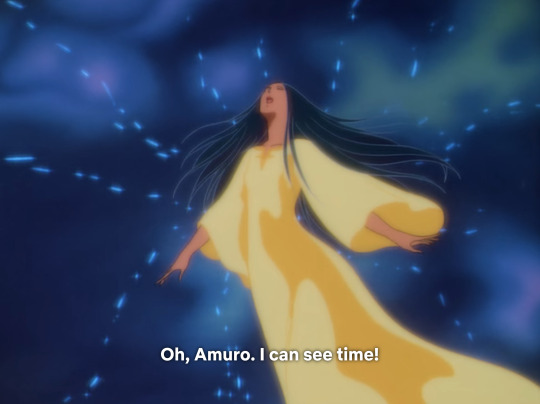
This ties in with the idea of a greater cosmic collectivism, or a pervasive animism in the universe that retrieves and emits the energy of life in perpetuity. It is not a force that is necessarily guided by some greater will, but is simply a natural principle, responsible for guiding people inexorably towards a more harmonious future if they are willing to stay in tune with it– and, being a part of nature, this guidance is lost when nature is not respected. This goes hand in hand with the idea that whenever things have been thrown off balance, because of greed or pollution or strife, humanity will be doomed to suffer.
It’s a concept that’s found across lots of Japanese media, to say nothing of the religions and philosophies across the world that feature similar concepts. It’s perhaps not the first thing that people think of when they think of the Gundam franchise, but Tomino’s creation wouldn’t be what it is without this incorporation of hope and spirituality at its heart.
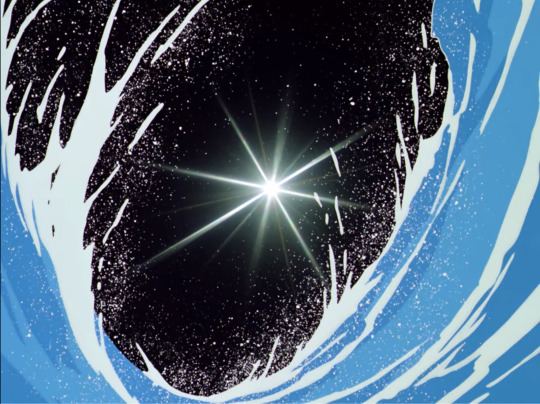
This is why Newtypes are lauded as the “next phase” of human evolution– not because they have “superpowers”, but because they have the ability to transcend the human instinct towards violence and competition by virtue of their capacity to understand and empathize instantly with each other.
Newtypes are adapted to living in the stars, free from the “pull of gravity” which represents the limited and violent instincts of earth-bound mankind; attuned to a greater universal spirit, they are the harbingers of a peaceful utopia for future generations.
–At least, that is the hope for them according to the doctrine of those desiring independence for the emigrants in space.
The tragedy of Newtypes is that they are a generation of young people, uniquely endowed for exploring the potentials of space in total harmony with each other– and they have almost without exception been co-opted by competing military factions eager to exploit their latent talents as superior mobile suit pilots. Their abilities are forced out of them in combat; they are manipulated from infancy, brainwashed and conditioned to be easier to control by their handlers; their brains are studied and crudely adapted to create artificial Newtypes in labs whose sole purpose is to become elite soldiers. Even when they are not being actively abused by a military authority, Newtypes are still most frequently encouraged to use their potential in service of war before any other path they might choose.
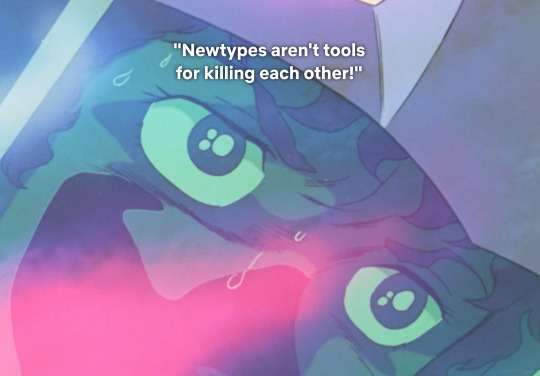
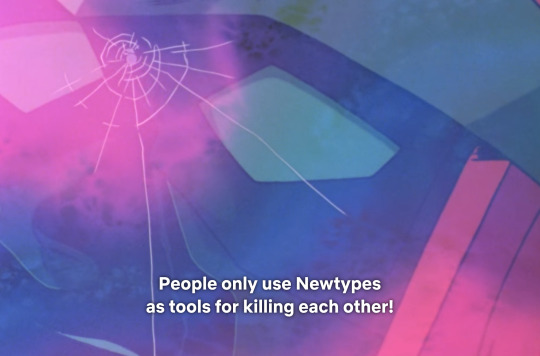
What to do about the generational divide between Newtypes and “Oldtypes” within the bleak reality of a wartorn era where talented young people are forced into military pipelines to die for governments that fear them is a central dilemma of the Universal Century timeline, spanning many series.

…But you don’t have to worry about any of that! Because there are no Newtypes in Gundam Wing.
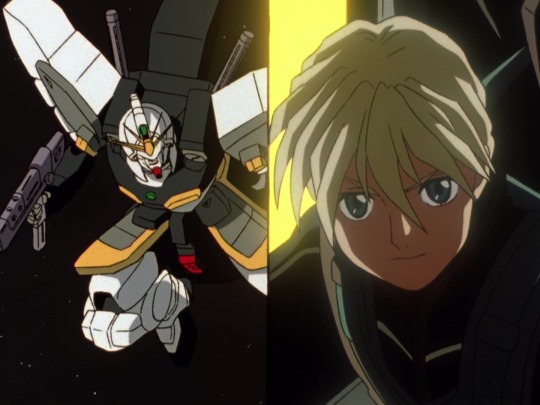
Oh sure, there are strangely Force-sensitive people like Quatre! But that boy’s just touched is all. And sure, people sometimes have mysterious premonitions that turn out to be correct even when all evidence points to the contrary, but that’s just a wacky coincidence! Do mobile suits sometimes start moving on their own because they “sensed” the will of their pilots? Don’t be silly– machines just do weird shit sometimes! Don’t worry about it. In this timeline, if you want to see the future and have a mental breakdown because people are feeling too loud, you gotta do it the old fashioned way by plugging into the ZERO system, or trying some of Howard’s special strain.
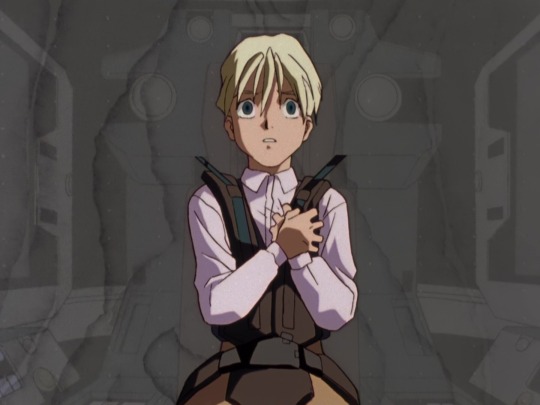
There are no Newtypes in Gundam Wing– that is to say, there are clearly some gifted individuals who have a set of undefined empathic and psychic abilities, but those people aren’t called “Newtypes”. They’re not called anything, because they’re not a thing, there is no in-universe explanation for them. We know Quatre has “the shine”, but other than him, we have no strong evidence that there is a new breed of space psychics emerging in the Colonies that will lead humanity to the next phase of its evolution (whatever that means).
EXCEPT: along comes the White Fang, and its self-appointed representative of the Colonies, Milliardo Peacecraft, spouting some extremist fringe theory about how people born in space are inherently superior to people born on Earth because they’ve transcended their inner chimp and are destined to carry on the species when the old breed of earthlings die out.
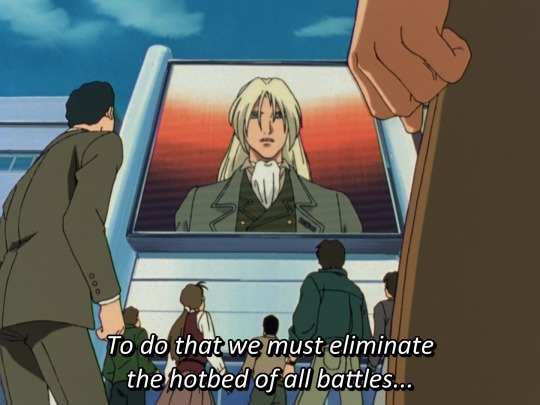
…If this sounds like some radical Zeon-pilled podcast nonsense, that’s because it is. There is NO established basis for these claims in AC 195. It is pure manufactured conspiracy theory horseshit. It’s a scare tactic, designed to sound like the deranged manifesto of an absolute maniac who NO ONE agrees with, and NO ONE wants in charge of a planetfucker-class space battleship pointed at earth. And that’s the point.
For more on this topic, see the entry on The Char Aznable Problem.

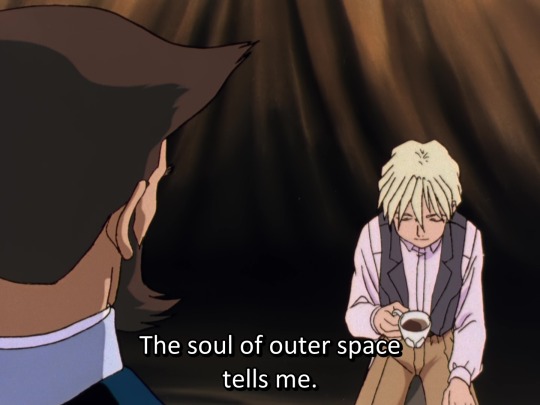
…But hold on, what IS up with Quatre then? Are there empathic space psychics or not? There’s obviously at least one, but does that mean there are others?
Maybe. There’s definitely SOMETHING going on that’s making people just a little bit special, a little bit faster and more durable with better reaction times, who are extra in tune with their surroundings, or have a heightened ability to sense the emotional states of other people. It’s not limited to people from space either– Zechs seems to have inherited a suite of enhanced reflexes, and increased physical endurance that allows him to fuck around with G-forces that ought to turn his brain into soup; meanwhile Relena got all of the personal charisma and the ability to sense people’s intentions that her brother lacks.
But way more significantly, the most perceptive characters seem to have a kind of future compass pulling them in the direction of a particular future that they sense is “correct”. While it’d be tricky to prove that this is distinct from regular old fashioned intuition, what IS certain is that this intuition plays a significant role in the universe of Gundam Wing.
This strong intuitive pull towards connectedness and (just wild beat?) communication does seem to suggest that there could be a distant, animistic cosmic force at play that the more empathically gifted characters can sense to varying degrees, just like there is in the universe of Mobile Suit Gundam.
That would mean Quatre isn’t the only one of… whatever he is, it's MOST of the cast!
Again, what exactly constitutes a Newtype is mysterious; it’s more than a set of abilities, it’s the attunement to a collective human spirit and the universe. The Newtype-equivalents in Gundam Wing may be what they are simply because they have an awareness of it.
So what’s “the soul of outer space” that Quatre talks about? Well, that distant, cosmic force that’s drawing people together and towards greater harmony, I’d say!
And the person who finds themselves acting as an inciting catalyst for a cascade of events drawing everyone forward would be at the center– the heart, one might say– of all those connected destinies converging in space.
…Or maybe that’s just the open puncture wound talking.

Quatre, sweetie, you’ve lost a lot of blood, let’s get you to bed.
#gundam wing#gundam wing meta#gundam meta#newtypes#quatre winner#parsing post#gundam wingtionary#tinyozlion pgw
37 notes
·
View notes
Text
“Honor, Justice, Strength, Integrity” - Why Wufei’s 'Honor' is Different

Here’s an analogy:
Someone stands up proudly in the debate club. They say “Today I’m going to be arguing strenuously for a topic I know almost nothing about and can barely articulate my stance on, but I’m going to opine about it at length and with great authority.”
And you’re like: …Why?
Do you enjoy being humiliated? Do you like losing? Is this something you do often?
Why? Why stand up at all when you have absolutely no chance of making your point?
This is how Wufei feels about fighting. Wufei, after all, IS a debate kid.
People who have no way of defending their argument should stay seated. They shouldn’t be here in the first place. If you’re too weak to win, you’re only a detriment to your own cause; when you’re weak, you make your cause look weak, when you lose, your cause loses.
So sit down. You’re in the way. You’re embarrassing yourself.
--If most of us look in our hearts and think of something that we would, honestly, truly, stand up and throw a punch / take a punch for, our ability to WIN the fight isn’t necessarily part of our criteria for doing it. If you gotta punch a bully, you gotta punch a bully. We view that as having integrity.
Wufei would not agree– if you punch the bully and the bully wipes the floor with you, does it mean anything to anyone but you? And does your feeling of validation make it worthwhile to participate in a conflict that hands your enemy an easy victory? The bully is still Evil, he wouldn’t say otherwise. But you didn’t change that by getting your ass kicked; the bully lives to bully another day.
Why throw your life away for something you can't change? If the only thing you can do for you cause is die for it, then you need to get your priorities in order-- you should get better at fighting so you can WIN for what you believe in, or get out of the way of those who can, so you don't become a liability.
If a cause is worth fighting for, then as its champion you'd better commit to being strong enough not only to achieve victory, but to defend and enforce it– or don't you believe in your stance firmly enough to follow it through? If you can't bring yourself to implement it without hesitation, then your cause is not a worthy one. If you don't fully believe in the cause you're fighting for, then indecision will make you weak, and you will fail.
And it will be right that you fail. Because fighting without a unity of both commitment and moral authority is how you lose your way. It’s how unnecessary conflict and Evil are born: from the disorder left in the wake of those who fight without understanding of what they're trying to achieve or lack the resolve to implement it without compromise. To him, that internal unity of purpose is the measure of integrity. Never go to war without it.
“Honor” for Wufei is different from the “aretḗ” of Zechs and Treize. For Wufei, honor is a score you’re keeping with yourself and your family and your clan and your ancestors and your dead wife who’s spirit you idolize. It’s not glory, it’s not chivalry– honor is your reputation. It’s a designation of value assigned by your community; it keeps you accountable to them. If you are humiliated in battle, it disgraces you AND your community, and it is therefore their right to ostracize you. Honor is something you can lose-- not just by failing to meet your personal standards, but by by failure in general.
A circumstantial loss is one you can strengthen yourself against and bounce back from-- but a true defeat, one that ends with you knowing you've been bested by a far superior opponent? That is a failure. A deep and bruising mark of dishonor that makes you unfit to wield a weapon.

There’s an interesting, if perhaps cynical, description of “honor culture” that identifies it as a response to living in impoverished, tenuous, often remote conditions where there is minimal or no law enforcement. Your mileage may vary on that assessment, but one thing’s for sure, Wufei’s colony, the A0206 colony of the L5 cluster, fits all of those criteria.
The Long clan’s reputation for great strength led them to be exiled by an insecure government to a decrepit, 200 year old relic of a colony teetering on the brink of extinction at the very edge of civilization. They have no money and few resources, their population is dwindling, the life support systems grow more tenuous by the year. The Alliance / OZ think of the people still living in L5 as vermin skittering around space trash. The Barton Foundation’s original plan for Operation Meteor designated A0206 as the colony destined for earth drop. Both Earth and Space seem in agreement that his home is scrap metal waiting to be disposed of. The only resources of value Wufei's clan have are the few young people like him who are capable of fighting, and their honor as a people. (…And one Gundam with no ammunition.)
The Long Clan is depicted as being very strict, proud, and extremely conservative. They adhere to a Confucian tradition that values obedience to social hierarchies, and the acceptance of one’s social role within that hierarchy. It is understood that those with superior standing should maintain virtuous and moral conduct, and that those who are subordinate should obey them as long as this remains true. Civil order and peace is the expected result of maintaining this propriety. It is also expected that people strive for perfection and harmony in every aspect of life, with the understanding that perfection is a state that can be achieved. It’s very likely that the strict adherence to these very traditional precepts is what helps A0206’s small, endangered population maintain cohesion in the face of constant peril, and it would explain why these traditions have close to a religious significance for those living there, including Wufei.
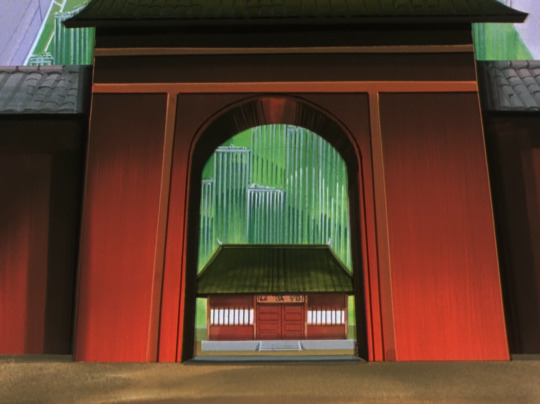
The hierarchies of this system are fundamentally patriarchal. Meilan is considered the “strongest in her clan”, but this seems to be something of a ceremonial designation, as she is repeatedly told not to fight in real battles on account of being a woman. In fact, it she seems to be the only woman with a visible presence in the colony. It’s possible that women are a rarity in the declining state of A0206, thus giving her increased value and status and making the rest of the clan overprotective of her-- but whatever the case, she must take on the spiritual mantle of Nataku to transcend her status as a woman and fight.
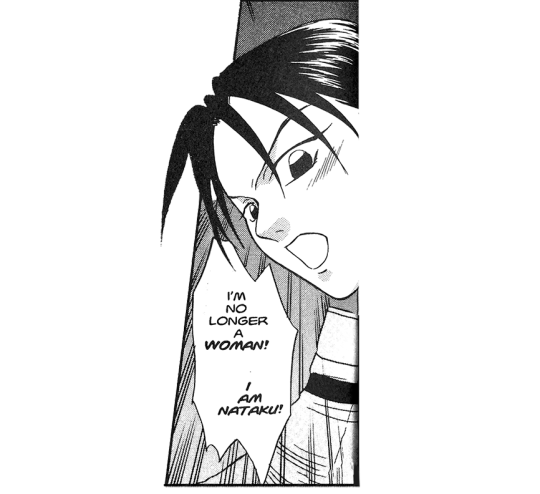
This is partly why Meilan finds Wufei so deeply infuriating when they first meet: she and Wufei are the strongest and perhaps ONLY members of their generation who are able to fight, and he (the one allowed and expected to fight by virtue of being male) refused to do so. Wufei did not see the point in fighting for a subjective concept– “Justice” lacks an absolute, universal definition, and therefore could not be defended.
--Like I said before: debate kid.
Besides being an infuriating nerd, Wufei risks his whole clan’s reputation by refusing to commit to the fight against the Evil. (…Also, they were about to be exterminated by the Alliance, so choosing to let everyone die rather than be rhetorically incorrect was a bit of a dick move– as his mentor Doctor O astutely observed). When Meilan shames him, it is specifically for being a failure as her husband, as well as for shirking his duties as the most capable member of the Long clan. For both of them, propriety is of key importance.
But unlike Wufei, Meilan has no trouble reconciling her conviction to fight with her sense of justice. To her, it’s obvious that the universality of justice is infinitely less important than making one’s own idea of justice a reality.
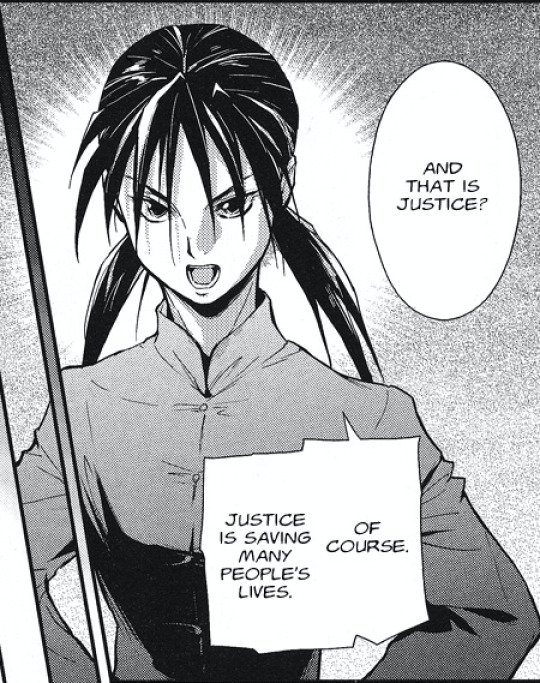
She isn’t having any of that what-about-ism bullshit– she is unhesitatingly ready to fight for what she understands to be true: that those who kill indiscriminately and oppress others for gain are Evil, and must be stopped so they cannot continue to do harm. And she fights also because… that is their way. The last and most enduring thing her people have is their identity, as ones who fight to uphold justice.
Ultimately, Meilan is killed while protecting the colony and Wufei. She is strong enough to win, but not strong enough to survive the victory. Their colony, their clan, and one the last few beautiful things they have managed to cultivate in spite of dereliction– their field of flowers, are safe for another day. If she hadn’t leapt to their defense first, Wufei would not have followed in the Gundam, and the population of the colony would likely have been killed en-masse by the Alliance, or decimated by OZ. She was directly responsible for their survival. Evil did not win, and yet, she died. She was strong, and yet she died. She was weak, and yet she was Justice embodied. Such a contradiction meant the universe had gone insane. It lost its way, it stood in need of correction.
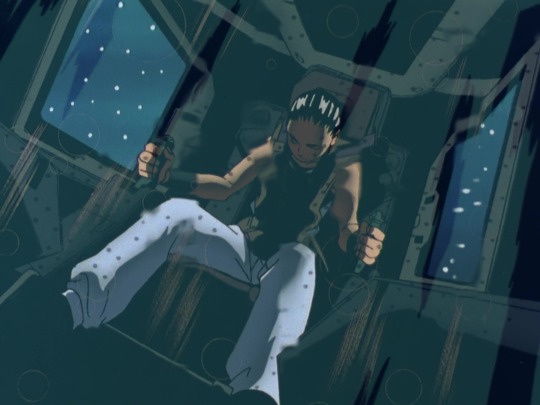
Wufei does not handle contradictions well. His ideology consists of absolutes and has no room for failure or extenuation. When the weak fight, they die, or they get in the way, so they shouldn’t fight. But Meilan– Nataku, was strong, and so, her spirit must live on in the Gundam, undying. It is her strength, her justice, which carries HIM to victory by lending him the strength of the mobile suit she died protecting. He must believe this, not only to honor her memory, but to preserve the structure of his ideology.
When he encounters women in combat who remind him of her, he reacts with outbursts of sublimated anger and grief that is redirected into misogynistic vitriol. Women who fight will die, don’t they understand? They continue to pick up arms and fight anyway, even when they’re weak, even when they cannot possibly win. They’ll foolishly rush ahead because they believe in what they fight for, and it will kill them. But he will not be the reason for it. He will make them understand that they are weak, so they will stop fighting.
--But they don’t. And he has no idea how to deal with it. Just as he has no idea how to deal with his own defeat, until once again, a woman finds it worthwhile to help him regain his conviction and sense of justice, by demonstrating her own.

He is a trad-i-tional boy, living in a trad-i-tional world.
<-Back! —————————- Onward!->
51 notes
·
View notes
Text
“Little Prince” / “Prince of the Stars” - Literature References in GW
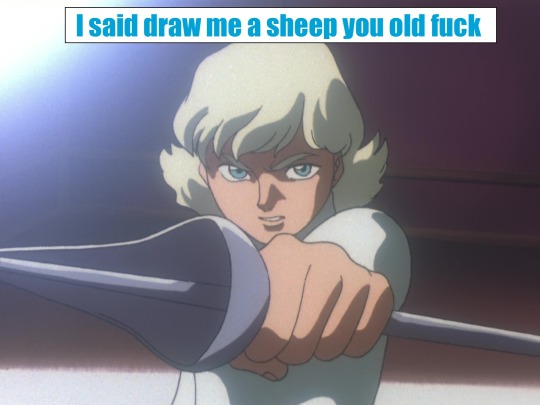
I am so delighted to report that the phrase Relena uses in episode 2-- "Does that mean Heero is a... Little Prince?" (or "Star Prince" in Japanese)-- is exactly what it seems to be:
It’s a reference to "The Little Prince", by Antoine de Saint-Exupéry.
More specifically, it’s from one of the backstories in “Episode Zero”– giving you yet another reason to read this important supplementary manga! It’s also featured in the new manga adaptation of GW, “Glory Of Losers”, which is excellent.
--Saint-Exupéry was himself an aristocrat by birth, and a notable pilot. He flew both as a pioneer of international postal flights, and as a fighter for the liberation of occupied France in WWII. He was shot down on a reconnaissance mission, flying his P-38 Lightning over the Mediterranean, and disappeared without confirmation of a wreck or his death. He was presumed missing in action until in the final years of the 20th century, when a silver bracelet with his identifiers was discovered off the coast of Marseilles .
Fun fact: if you read “The Little Prince” with Gundam Wing in mind, you will experience Several emotions!

--Once upon a time, Relena Darlain encountered a lovely, somber young man who came from the sky and rescued her from danger. She did not trust him, because he had come in a Mobile Suit, a machine of war and death. He called her “princess”, almost without thinking, as if it were the natural thing to call her– this was terribly confusing, for she was certain she was not a princess of any kind.
Thinking the young man was simply being whimsical, she asked whether that made him a knight, or a dragon? He looked distant for a moment, as if conflicted by something weighing heavily upon him, but then gave a response suiting the theme of the moment, saying “I’m a prince from the stars”.
The somber young man was indeed a little prince, who you might imagine came from a very small kingdom– home to a beautiful rose that was as fearless as she was helpless, with only little thorns to protect her that would not even deter a hungry sheep. He had run away from the responsibilities of this kingdom, and now could not return. When he’d first come to earth, he met a fox, who told him the only way to truly understand things was to tame them, and that one was responsible forever for the things that one tamed. The fox had said only that which was intangible really mattered. This had made him appreciate and love his rose even more, though she was far beyond his reach now, and the intangible goals he sought would only take him farther away.
Years later, the girl Relena Darlain met another somber young man who had fallen from the sky as a shooting star– he was fierce and wild and not at all like the little prince she had met when she was a child. But he had come from the stars all the same, and something about him reminded her of that first encounter, and of the children's book of the same name. They were both hurt, and lost, and very alone. She said this thought aloud to herself dreamily, because at that moment she was still a child, though she wouldn’t be for very much longer.
—
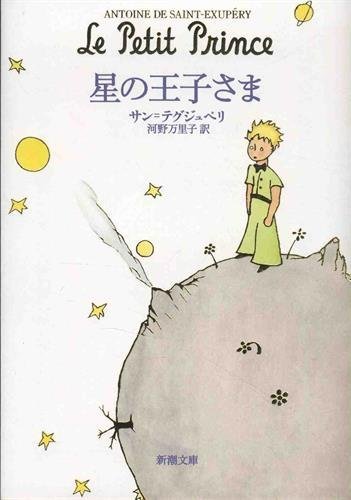
–The title of the Japanese translation of Le Petit Prince is “Hoshi no ouji sama”-- the subtitles for this in the anime read “Star Prince”, which is correct for Japan, and in the dub it is “Little Prince”, which is correct for the English title. This is a lovely bit of translation synchrony that doesn’t help one single bit in understanding what Relena means when she says this! But that is why we have Episode Zero, and if you really need proof that this is indeed a reference to the childrens’ book, I believe Sumisawa brings it up explicitly in Frozen Teardrop.
Gundam Wing is chock FULL of references to western lit and film– Wizard of OZ, White Fang, Lawrence of Arabia, Roman Holiday; “Darlain” is close enough to “Darling” that I suspect it’s a Peter Pan reference, and even Lady Une’s name is likely a reference to My Fair Lady, due to a very early scrapped idea for her character where she was a sort of clumsy, provincial girl that Treize was teaching to be “elegant”-- an element that stayed on in the series, albeit in a MUCH different context from Henry Higgins / Eliza Doolittle, thank god.
“Come on Gundam, move your bloomin’ arse!”
#parsing post#Gundam Wing#Milliardo Peacecraft#Relena Peacecraft#Heero Yuy#Wing Watcher's Toolkit#Gundam Wingtionary#tinyozlion pgw
33 notes
·
View notes
Text
“Act On My Emotions”: Heero’s Motto and What It Actually Means
This sounds like something you’d see on some kitchen decor or a motivational poster at the dentist office, but Heero is not a wine mom, nor is he a dentist. A third, secret thing.
The motto is a reference to yet another scene in Episode Zero, from Heero’s backstory. Odin Lowe, the assassin of Original-Flavor Heero Yuy (politician), and barely-qualifying surrogate parent to Heero Yuy (code name), tells baby!Heero this bit of wisdom right before fucking off and abandoning the kid to his own devices.
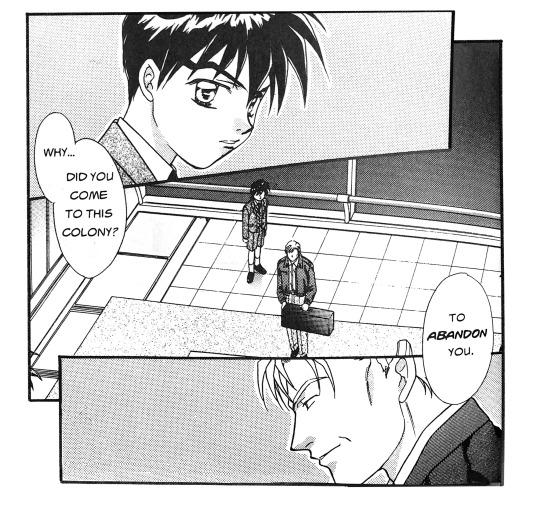
It’s the parting life-advice of a hollow, haunted man: You never know when some idiot (like me) will pull a trigger somewhere and change the future forever. So you might as well “act on your emotions” – or in another phrasing, “do as your heart tells you”.
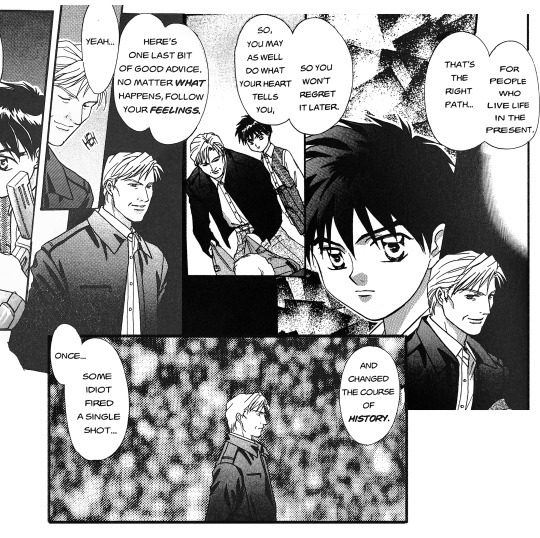
Literally: live in the moment. Act in the moment. Know what it is you value, so you can make snap judgments without wasting time on doubt, or fear, or questions, or trying to guess the endless repercussions of your actions– because you can’t. The future is always up for grabs, anyone could die at any second.
Don’t think about what comes after. Focus on the thing you need to do now, in order to keep living (“my enemy is anyone after my life…”). Don’t let anyone else make decisions for you (“… and anyone that toys with my life”). It’s the only way for someone with no future to maintain a kind of moral compass. It’s the only way to gain some control over your empty, rootless life.
When you’re a disposable resource, you don’t get to think about a higher meaning.

Just do what your heart tells you. Kid.
#Gundam Wingtionary#Wingwatcher's Toolkit#parsing post#tinyozlion pgw#A short and straightforward one - with big repercussions of course#Odin Lowe
18 notes
·
View notes
Text
The Gundam Wing-tionary: What They Say vs. What They Mean
You’ve probably noticed that the characters in Gundam Wing frequently repeat certain Meaningful Words– words that, diegetically, cover several distinct meanings that you will need to be able to decode.
It’s unfortunate that between the necessity of fitting syllables to lip-flaps and the perils of translating concepts from one cultural understanding to another, one sometimes ends up sounding like you’re trying to transcribe the works of Machiavelli using a six-word vocabulary. Despite this, if you can solve for “x" in a given dialogue, the decoded content of what is being said is remarkably sophisticated.
The simplistic vocabulary of Gundam Wing has sometimes been brought up as proof that its handling of heavy topics is sophomoric and overreaching. While I absolutely understand that it’s a piece of pop culture and not the product of a great political essayist or philosopher, I object on principle to the idea that using simple language to discuss complex topics makes the discussion less meaningful, or that pop culture isn’t a viable medium for those discussions.
More than 20 years after it aired, the writers and directors of Gundam Wing still cite it as some of their best work that they’re most proud of. Hell, Sumisawa keeps writing semi-canonical fanfic for his own series just because he’s into it and has more to say!
The creators were given a blank slate to tell a story with war as a backdrop, and they took that opportunity to explore challenging questions about subjective morality, ethics, and human nature, which they intentionally leave unresolved. It invites us to make our own assessment of the various ideologies and their outcomes.
Sometimes you have to trust that what you’re hearing can be taken seriously, if you let it be.
Ultimately, it is up to the viewer to interpret the validity of what is being said, but it helps to have a basic Gundam-to-English dictionary to decipher WHAT is being said.
6 notes
·
View notes